




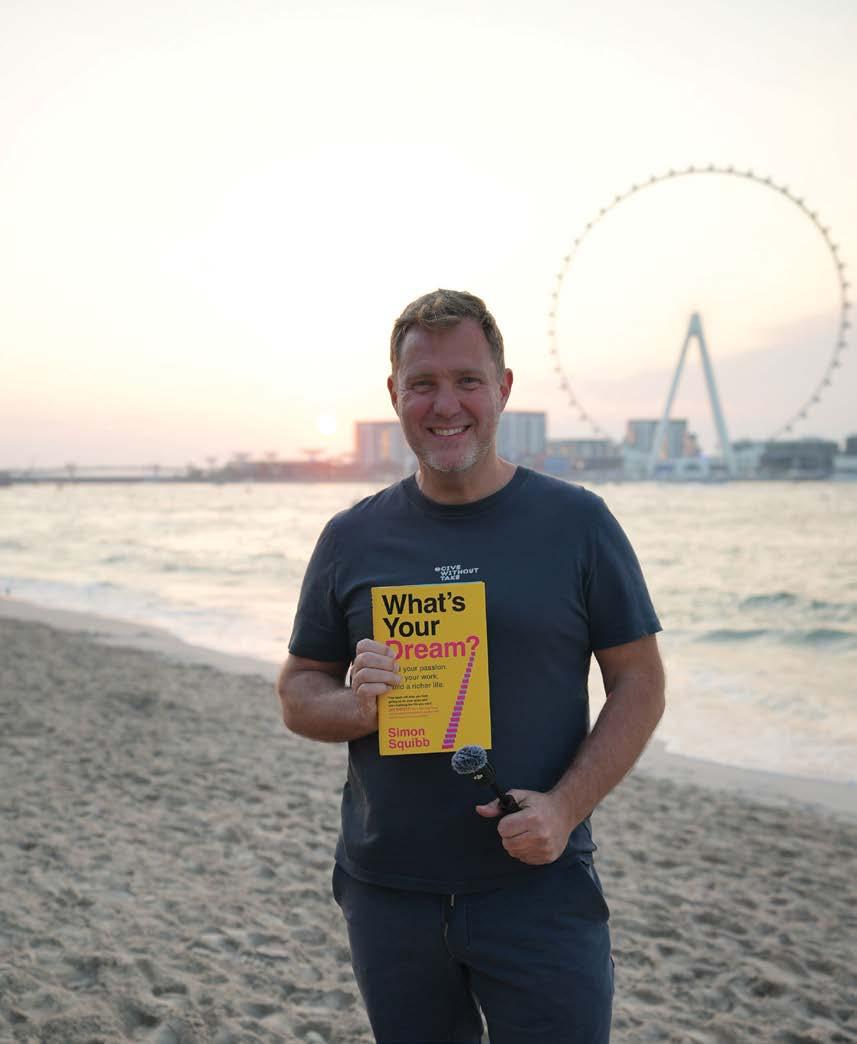
Simon Squibb wants to transform job centres into ‘dream centres,’ boost financial literacy, and revamp the UK start-up scene


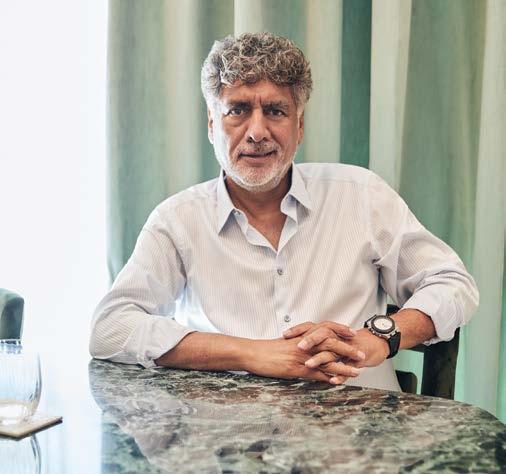
20 After the Win Before the Wave
InSilicoTrials wins at The AI Summit London 24 Sharp Instincts in the Age of AI Entrepreneur James Caan reveals all
FEATURES EDITOR Patricia Cullen patricia.cullen@bncb2b.com
CEO Wissam Younane wissam@bncpublishing.net
MANAGING DIRECTOR Rabih Najm rabih@bncpublishing.net
ART DIRECTOR Simona El Khoury
EDITORIAL TEAM Tamara Pupic, Aalia Mehreen Ahmed
MEDIA SALES MANAGER Olha Kovalova olha.kovalova@bncb2b.com
GENERAL MANAGER Daniel Malins daniel@bncb2b.com
REGIONAL DIRECTOR Andy B. andy@bncb2b.com
CONTRIBUTING WRITERS Omar Hamdi, Kamales Lardi, Callum Scott, Elliot Kay
SUBSCRIBE Contact subscriptions@bncb2b.com to receive Entrepreneur United Kingdom every issue.
COMMERCIAL ENQUIRIES sales@bncb2b.com
Access fresh content daily on our website

Entrepreneurship is often portrayed as a straight line - start here, scale there, and success follows. But for many, the journey is more like a labyrinth: winding, unpredictable, and full of unexpected turns. In this Entrepreneur UK July issue we catch up with Karim Fatehi MBE, Chief Executive of the London Chamber of Commerce, where he champions London’s business community with cautious optimism. The capital has long been the heartbeat of UK entrepreneurship, drawing founders with its vibrant ecosystem and vast opportunities. For many, London remains the centre of gravity. Yet, as our feature Life After London reveals, stepping outside the city also offers something incredibly worthwhile.
Across the country, a growing number of entrepreneurs are choosing to build their businesses beyond the capital. These founders aren’t turning their backs on The Big Smoke; rather, they’re seeking environments that offer a different kind of opportunity - closer ties to community, a clearer sense of purpose, and the freedom to innovate without the constraints of urban congestion and cost. Their stories remind us that entrepreneurial spirit thrives in many places here in the UK, not just in a London postcode. In another feature, James Caan CBE, entrepreneur and
investor, offers sharp insight into a vital element for today’s founders: judgment. In an era dominated by artificial intelligence (AI) and data, Caan argues that instinct and experience remain irreplaceable. For all the hype around technology, it’s the human ability to read a room, assess risk, and make bold decisions that still gives leaders their edge. Meanwhile, Tom Wood, Head of Business Banking at HSBC, shares how his team supports the next generation of UK entrepreneurs - not just by providing finance, but also guidance. It’s a reminder that behind every ambitious business is a network of support, often working quietly in the background. This month’s cover feature spotlights Simon Squibb, the founder and CEO of HelpBnk - a platform designed to help people start and grow businesses while being rewarded for supporting others. HelpBnk has grown into a vital community for over 250,000 members, and Squibb’s social media channels attract half a billion views each month. He didn’t want to be an entrepreneur - he had to be one. From his early days as a teenage gardener to becoming a leader in community-driven start-up support, his journey reflects how necessity can evolve into purpose. Inside, we explore Squibb’s perspectives on disrupting education, fostering growth, and making entrepreneurship accessible to all. At the heart of his approach is a simple but powerful question he asks: ‘What’s your dream, and how can I help you turn that into a reality?’ Now, that’s what I call dreamy.
In this July issue of Entrepreneur UK, we explore why so many businesses struggle to secure funding - and share practical ways to fix it. We also delve into the often unspoken reality of loneliness in business and how community can be a lifeline. Other features include start-ups tackling food waste, and a deep dive into the art of building trust before traction - a vital but often overlooked step in early business growth. Finally, for those with global ambition, we turn to an expert for clear-eyed advice on expanding to the UAE.
Entrepreneurship isn’t about ticking boxes or following a script. It’s about chasing your dream, finding your people, and embracing every twist along the way. That kind of journey changes everything.
Hope you enjoy the read!
Patricia Cullen
Features Editor, Entrepreneur United Kingdom

PATRICIA CULLEN

London is known as the epicentre of UK innovation - a glittering magnet for entrepreneurs, investors and talent alike. The city’s sprawling start-up ecosystem pulses with opportunity: networking events, venture capital firms, accelerators, and a dense community
of like-minded disruptors. But beneath the surface, a quiet revolution is unfolding across the North, in cities like Manchester, where founders are challenging the assumption that success means being based in the capital.
The story of these northern start-ups is not one of scarcity or compromise, but of strategic choice and unexpected advantages. For founders like Harvey Lowe, co-founder of Arcube, a travel sector start-up, and Jana Stella, founder of NeuWave Technologies - both residents of Sister, Manchester’s £1.7bn innovation district - the decision to build outside London has been liberating. Sister is fast becoming one of the UK’s leading innovation districts, providing a fertile ecosystem for ambitious start-ups to thrive beyond the capital.
Lowe explains: “For a lot of companies, they are located in London to be closer to other start-ups, suppliers, clients, etc. However, operating in London comes with significantly higher costs, which can be challenging for start-ups - especially when a London base isn’t essential. For us – operating in the travel sector - being located in the capital isn’t critical for reaching customers or prospects as we often travel to international events to meet airline companies.” Manchester offers Arcube benefits that might be overlooked by a capital-centric mindset.
“We’re linked very closely with the university, and are able to tap into great graduate and higher education talent pools, which would be harder to connect to given the expanse of the ecosystem in London,” Lowe says. That local connection extends to suppliers too. “We also see that a surprising number of our suppliers are actually based in Manchester, Leeds and the general North. It’s great to meet these people in-person which wouldn’t happen if we were down South.”
Stella echoes these advantages from a highly specialised sector. “Our sector requires a niche skillset (in wave modelling and oceanography)
→ Harvey Lowe, co-founder of Arcube

“People assume being outside London means you have less access to opportunity, capital, and talent. The reality for us is that we’re less distracted by the noise, and we can work with a leaner team without compromising on quality”
where the speciality really lies outside of London. Being in Manchester means we can tap into our technical network easily. We’ve also really benefitted from local initiatives for office space and funding.” Cost efficiency is another critical factor: “It’s definitely helped from a cost perspective. Building a start-up already requires close monitoring of expenditure, so the
funding outside of London stretches much further.”
Both founders challenge the myth that location limits access to capital and opportunity. “People assume being outside London means you have less access to opportunity, capital, and talent. The reality for us is that we’re less distracted by the noise, and we can work with a leaner team without compromising on quality,” Lowe says.

→ Jana Stella, founder of NeuWave Technologies
BUILDING OUTSIDE THE CAPITAL GIVES US MORE FREEDOM. WE’RE ABLE TO MAKE DECISIONS WITHOUT BEING CAUGHT UP IN THE NOISE OR TRENDS THAT MAKE UP THE LONDON SCENE. THERE’S LESS PRESSURE TO FOLLOW WHAT EVERYONE ELSE IS DOING”
Stella adds, “It’s industry dependent, but for us it hasn’t been the case. Sure, a lot of our investment is London based, but it’s only a
train ride away. Our customers are all over the British coastlines.”
For Lowe, the quality of life is tangible: “I only have a 25
minute ‘commute’ (walk) to the office in the morning given that the city is so walkable!” Despite occasional questions about
location - “People outside the UK sometimes ask if we’re based in London” - it’s never really a concern. “We are two hours away from London if we have to be there for a meeting or event.”
Freedom from the London bubble is the real prize.
“Building outside the capital gives us more freedom. We’re able to make decisions without being caught up in the noise or trends that make up the London scene. There’s less pressure to follow what everyone else is doing,” Lowe says. Minor inconveniences like “slightly longer travel times” don’t slow progress. “We’ve got all the access to capital, talent, and opportunity we need. The trade-off is worth it and we aren’t looking back.”
Alongside the technical and operational advantages championed by Lowe and Stella, Rachel Morgan-Trimmer, founder of Firebird - a Manchester-based neurodivergent consultancy - highlights a more intangible but equally crucial benefit: community. “People always say the North is friendlier but it really makes an impact when it comes to networking, helping other people out, etc.” For Morgan-Trimmer, this warmth isn’t just anecdotal; it’s an essential pillar for building a business rooted in inclusivity and connection. As a neurodivergent entrepreneur, she also appreciates practical lifestyle differences. “Travelling about is a bit easier, partly because it’s less crowded and city centres are more concentrated.”
Morgan-Trimmer challenges
another pervasive myth about location and opportunity. “They think you ‘have’ to be in London to get anywhere or do anything. I actually do a lot of work in London and it doesn’t make a difference to them (or my other clients) where I’m based. I can do Manchester to London and back in a day. I don’t think there are fewer opportunities in the North than there are in London.” On the question of feeling underestimated because of her location, Morgan-Trimmer is unequivocal. “No. In this day and age, I find that people don’t really care where you’re based. In fact, many of my clients don’t even know until I mention it!” The freedom this founder finds outside London is both professional and personal. “I love London, don’t get me wrong, but having grown up down south, I definitely prefer living and working in Manchester. I find the culture here to be friendly, supportive and a bit more direct – which obviously is perfect for a neurodivergent entrepreneur!”
The new geography of opportunity
What unites these founders is a shared rejection of London as a prerequisite for innovation. Instead, they embrace the strategic advantages of their location, supported by strong local ecosystems, universities, funding initiatives, and a cultural vibrancy that’s often missing from capital life.
Manchester’s Sister innovation district, backed
by a £1.7bn investment, exemplifies the regional drive to build world-class environments that nurture start-ups without the London price tag. It’s a place where businesses can tap into highly skilled talent, access cutting-edge research, and connect with suppliers and partners - all while enjoying a quality of life that fosters focus and creativity.
This shift is also supported by the reality of modern connectivity. The ability to travel to London in a matter of hours, combined with digital tools that facilitate remote working and global outreach, means start-ups no longer need to choose between presence and opportunity.
“They think you ‘have’ to be in London to get anywhere or do anything. I actually do a lot of work in London and it doesn’t make a difference to them (or my other clients) where I’m based
London remains a powerhouse - a city of ideas, capital and unmatched density - but it’s no longer the only game in

→ Rachel Morgan-Trimmer, founder of Firebird ”
town. For founders like Lowe, Stella and MorganTrimmer, Manchester offers something different: space to think, room to grow, and a community that prizes collaboration over competition. The shift isn’t about turning away from the capital, but expanding the idea of where innovation can thrive. As start-ups flourish beyond the old postcode boundaries, one thing is becoming clear: the future of UK entrepreneurship is not about choosing between London and elsewhereit’s about making both work, on your own terms.
While some London insiders may still view the capital as the only place for innovation, the stories of Lowe, Stella, and Morgan-Trimmer highlight a broader truth: success is no longer about geography alone, but about mindset, community, and strategic choice.
“Our results speak louder than our location,” Lowe adds.
How Greyparrot built a global AI powerhouse in under five years by
ENTREPRENEUR UK STAFF
In the tech world, ‘waste’ rarely makes the shortlist of blue-chip market opportunities. But for Mikela Druckman, co-founder and CEO of Greyparrot, a clean-tech company using artificial intelligence (AI) to revolutionise waste sorting and recycling, the status quo was a glaring omission. “Depth over breadth has been hugely important for us. From day one, we made a deliberate decision to focus on the waste industry - an under-digitised sector with massive environmental and economic impact.” The bet on waste paid off - and fast. By focusing tightly on what she calls “deep domain expertise in waste analytics,” Greyparrot turned ignorance into insight and insight into impact.
Rather than spreading thin, Greyparrot doubled down on a single sector and on one type of technology. “A big early bet was our approach to hardware. While we do deploy hardware to gather data, we made a conscious decision not to build robotic arms or complex recycling plant machinery ourselves.” Their team built software that works with existing hardware in recycling plants - from Bollegraaf to Van Dyk - enabling rapid scale without reinventing industrial infrastructure. “That choice set us apart. It allowed us to scale faster, stay agile, and focus on what we do best: building industry-leading AI models, data infrastructure, and integrations that work across any plant setup. We recognised early on that access to large-scale, high-quality data would be one of the most valuable assets we could build - and that’s become a core strength.”

Greyparrot’s growth model rests on collaboration. By partnering with established players the company expanded from day one - globally. “Greyparrot is an AI and data software specialist, and we partner with the best in the business when it comes to plant builders, robotics, and system integration.” These alliances were strategic turbochargers. Together with Bollegraaf and Van Dyk, Greyparrot deployed its systems across 20 countries, analysing tens of billions of waste objects annually. “Today, we’re proud to be a global clean tech leader.”
The world’s fastest-growing consumer goods sector was generating almost no intelligence, and Druckman turned that ignorance into opportunity with hard metrics: “In one
instance, a single contamination alert from our system saved a European facility £47,000 in reprocessing costs and fines. In another, our AI identified an aluminium sorting issue in minutessaving £48,000 on a single batch of material.” Those case studies became proof. And with packaging under regulatory pressure, Greyparrot’s ability to trace material flow upstream - into manufacturing - unlocked a new narrative: “We’re helping brands understand the downstream consequences of their packaging design decisions… Insights don’t just enhance recyclingthey directly inform packaging design, support regulatory compliance, and accelerate progress toward circularity goals.”
Greyparrot’s Deepnest platform takes consumer goods companies into live-feedback mode. Instead of theoretical recyclability, they can now see what happens to packaging postconsumption - data that could prompt rapid design shifts.
When AI meets real-world complexity, blind spots reveal themselves.
Greyparrot found wasted money hiding in unexpected places: “I was surprised by the scale of invisible inefficiencies… Over the last year alone, our systems detected and categorised over 40bn waste objects into 111
categories, revealing massive shifts in quality and contamination over the course of a single day.” Packing shrink sleeves and resistant materials like Tetra Pakdesigned without recycling in mindbecame tangible examples of downstream effects.
“Take Lucozade bottles - their full plastic shrink sleeve meant that they weren’t being recognised by recycling machinery, so they spent £6m to redesign more sustainable products.” With real-time data, companies can emerge with 10–20% recovery gains in a single shift.
Opportunities in the $3tn waste sector
Waste’s disruptability is debated, but Druckman points to three major shifts driving this opportunity:
1/ Smarter hardware integration, with AI embedded into the sorting process.
2/ AI retrofits for legacy plants, offering high ROI without new infrastructure.
3/ Emerging data-driven compliance, led through platforms like Deepnestconnecting material flow to brand decisions.
“Analysing 15 tonnes of waste typically takes a trained staff member around 375 hours. With

AI, it takes six.” For entrepreneurs, this suggests embedding your tech, retrofitting old systems, or influencing upstream incentiveswhile leaving physical assets in place.
The reality check Greyparrot’s success isn’t a fairy tale. The company has survived pandemics, downturns, and hypercautious fundraising environments. “One of the biggest lessons that’s shaped how we’ve built Greyparrot is the importance of resilience - not just in the technology, but in the business itself.” Steady growth and autonomy in her team proved that momentum didn’t rely on a singular figure. “During my second maternity leave, the team not only kept things running - they delivered growth in both headcount and revenue.” That’s not just good leadership; it’s a replicable organisational structure
fit for start-ups scaling globally.
A circular future fueled by AI
Looking ahead, Druckman sees AI as the operating system for recycling plants, but the bigger play lies elsewhere: “AI is laying the foundation for circular decision-making. Data from waste is now flowing upstream to inform how products are designed, tested, and improved - closing the loop between packaging innovation and recyclability.” Plants are just the beginning. The next layer is connecting recycling feedback to packaging, design, and supply chains.
“Entrepreneurs will play a huge role in scaling this transformation, and that’s what we’re doing with Deepnest.” By rethinking rubbish, Greyparrot shows how innovation can recycle old problems into new possibilities - a truly circular success story.
The London Chamber of Commerce Chief on business resilience, start-ups and surviving the storm by
PATRICIA CULLEN
In the UK capital, somewhere off the corridors of power, Karim Fatehi OBE, CEO of the London Chamber of Commerce and Industry, is doing what he does best: advocating for business while carefully navigating the crosswinds of policy, politics and persistent economic unease.
Caution may underpin the Chamber’s latest message, but it is matched by a quiet sense of determination. Representing a network of approximately 10,000 businesses — from fledgling start-ups to heavyweight corporates - the organisation occupies a unique position in the economic landscape. For Fatehi, the challenges ahead are undeniable. But so too, he insists, are the grounds for hope.
“We’ve seen through the COVID-19 pandemic and Brexit, and we are currently navigating the recent economic shocks,” he says. “London has always been, and continues to be, a major global city when it comes to showcasing resilience.” Yet resilience, he suggests, is under siege. “Businesses are feeling the strain — caught between global economic headwinds and the ripple effects of domestic policy, including hikes in national insurance and tighter employment regulations. The hospitality sector, for example, is having to make some tough decisions on pay, potential redundancies and the viability of operating in the long term”
This is not just an impressionistic concern. “We’ve done a survey with our members,” he says. “85% of the businesses are not expecting economic growth during the current parliament.” It’s a damning figure. There is,
Fatehi insists, no single silver bulletbut there are some obvious fixes. What’s missing, he argues, is sustained support for growth. “We also need to ease the tax burden on businessesfrom national insurance to business rates and beyond.” Despite the frustrations, the CEO insists the Chamber remains hopeful - and that its network plays a critical role in keeping the ecosystem alive. “Naturally, the Chamber informs and advocates for SMEs… we’ve got to be optimistic.”
The organisation takes a broad yet practical approach, balancing strategic vision with on-the-ground support. “Our extensive network allows us to act in our members’ best interests and engage directly with decision-makers.” he says. The Chamber’s events - including a recent breakfast roundtable featuring Lord Johnson, Deputy Chair of the
BUSINESSES ARE FEELING THE STRAIN - CAUGHT BETWEEN GLOBAL ECONOMIC HEADWINDS AND THE RIPPLE EFFECTS OF DOMESTIC POLICY, INCLUDING HIKES IN NATIONAL INSURANCE AND TIGHTER EMPLOYMENT REGULATIONS.

Conservative Party and Andrew Bailey, Governor of the Bank of England, amongst others - are one way they help businesses speak directly to policymakers. The focus? “How can the business effectively manage these additional costs without hindering the growth?”
Pressed on what businesses are looking for, Fatehi is clear: “What businesses want is prosperity,” he said. “They’re looking for an environment that allows them to engage with their European counterparts with minimal friction - free from
“ ”
What businesses want is prosperity. They’re looking for an environment that allows them to engage with their European counterparts with minimal friction - free from unnecessary barriers, so they can grow and thrive.

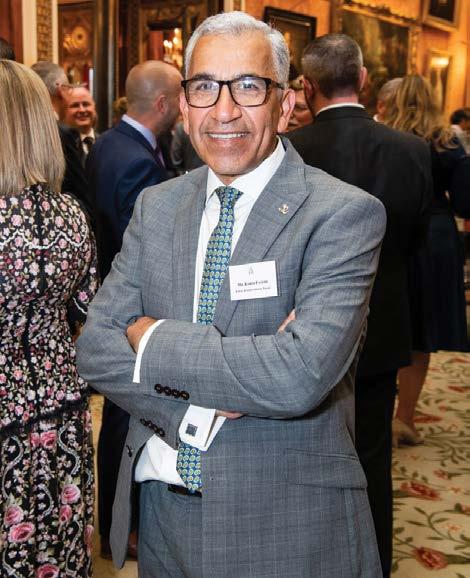
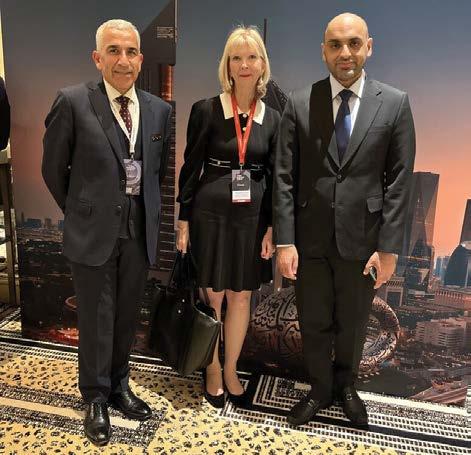
unnecessary barriers, so they can grow and thrive.” His advice to founders navigating trade volatility and rising costs is clear-eyed and pragmatic. “We’ve seen the tariffs, which is 10% for all UK exporters…but it wasn’t 25% like other tariffs.” That thread of optimism runs through, even as global trade rules grow ever more uncertain. What drives the Chamber’s forward-looking outlook, he explains, is London’s enduring role in the global order.
“We are in a very unique position… London remains the global hub for international trade and a magnet for businesses worldwide. We need to retain our position.”
Just this week, Fatehi points out, momentum was building: “We had the opportunity to see the FTA between India and the United Kingdom has come to reality. Also, the U.S. and there are other FTAs on the horizon.” As he sees it, the task is clear: to help businesses capitalise on those opportunities.
“It’s crucial for London’s business communities to seize the opportunity, explore new markets, and unlock their potential,” he said. “We must identify the best path forward.”
There’s a realism to his tone, but it is balanced by a quiet pride in what London’s business community has achieved. “We must be resilient, we must remain optimistic, and we must be ready for the challenges ahead,” he said. “The UK remains steadfast in its commitment to business, demonstrating unwavering resilience and adaptability.”
“We must be resilient, we must remain optimistic, and we must be ready for the challenges ahead. The UK remains steadfast in its commitment to business, demonstrating unwavering resilience and adaptability


by OMAR HAMDI /

Nvidia had $29m of revenue at IPO, and Amazon had revenues of $16m at the time they went public. London has all the potential to provide companies with this growth opportunity” says Neil Shah, Head of Tech Primary Markets at the London Stock Exchange.
Despite comprising only 1.4% of the 503 companies in the S&P 500 index of the largest USlisted businesses, the ‘Magnificent 7’ (Apple, Microsoft, Amazon, Nvidia, Alphabet, Meta, and Tesla) were responsible for over 50% of the index’s total gains - and over 75% of its earnings growth - in 2024.
It’s sometimes hard to believe how small some of those companies were when they first went public, especially when high profile US IPOs are now reserved for companies with revenues in the billions, not millions. “When I started out in investment banking at Thomas Weisel Partners in 2009,” continues Shah, “there were software companies going public in the US with about $40 million in revenue. It is a very different picture today, that would just be impossible. It would probably still be impossible at $400m in revenue. $400m of revenue a quarter, maybe, but not annually.”
But it is still possible in London. This may come as a surprise to the average Brit who may only come across the London Stock Exchange in the evening news summary of the FTSE 100 with its big banks, big pharma and miners. The London Stock Exchange team gets as excited about early stage growth companies as they do about unicorns. Most stock exchanges have left the messy business of young, growing scale ups to VCs or Private Equity. Not so in London. “AIM turns 30 this year. It is the world’s most successful growth market and is run by the London Stock Exchange. Nominated advisers closely support companies not only through the IPO process, but thereafter. And some of the work required by a company to go public could potentially be done at a tenth of the cost of a US listing.”
“When companies choose to list in London, they can benefit from a full-time fundraising team in the form of the house broker retained by the company, meaning there is less of a burden on a company founder. And as public companies, they can also attract and incentivise talent in a liquid, transparent way that private companies cannot.” Shah also believes that (along with
AIM TURNS 30 THIS YEAR. IT IS THE WORLD’S MOST SUCCESSFUL GROWTH MARKET AND IS RUN BY THE LONDON STOCK EXCHANGE…AND SOME OF THE WORK REQUIRED BY A COMPANY TO GO PUBLIC COULD POTENTIALLY BE DONE AT A TENTH OF THE COST OF A US LISTING” “
a range of high-quality small cap funds and investors) Venture Capital Trusts, or VCTs - a unique British invention that combines the best of a Silicon Valley VC and a traditional small cap fundoffer an attractive alternative to more fashionable venture funding sources.
The traditional venture capital model has fueled household name successes like Uber, Facebook and Zoom. But it has also given the world high profile failures like WeWork, Theranos and 23andMe. London’s approach, where sensible valuations, supportive institutional investors and quality growth companies mingle, could be having its moment.
AIM has supported some fantastic founder-led companies such as Craneware which went public with $15m of revenue in 2007 ($200m today) and Cerillion, which went public in 2016 with £14m of revenue and a £22m market cap. Today, it’s worth over £450m.
Nvidia founder Jensen Huang took to the stage at London Tech Week in mid June, saying “The UK has one of the richest AI communities anywhere on the planet... and the third largest AI capital investment of anywhere in the world.”If Huang or Bezos were taking Nvidia or Amazon public today, they may be looking to the City, not Wall Street, for support. “British investors are really well-travelled. More than a third of our [London-listed] companies are international,” says Shah. “It doesn’t matter where you’re from, you can be successful here.”

Omar Hamdi is the founder of Pathos Communications

Fresh off their The AI Summit London win, InSilicoTrials is turning regulatory-grade AI into the backbone of nextgen drug development. by ENTREPRENEUR
UK STAFF
When Luca Emili stepped off the stage at The AI Summit London, clutching the event’s top innovation prize, it wasn’t just a moment of recognition - it was a quiet inflection point. For InSilicoTrials Technologies, the win marked more than validation; it signalled a shift in how the future of drug development might be written - not in wet labs or waiting rooms, but in algorithms, simulations, and code. “Winning The AI Summit London Package was a meaningful milestone for us. It confirmed the strength of the technology we have developed and validated the mission we are committed to.”
That mission? To embed safe, scalable, and regulatory-ready AI into the heart of clinical trials. Not as an optional extra, not in a decade’s time - but now. “Our goal is to bring safe, scalable, and regulatory-ready AI into the core of drug development. The exposure we gained through this recognition is already opening new doors.” InSilicoTrials has been developing regulatory-grade simulation platforms - once considered bleeding-edge science fiction - into practical tools now used by pharma leaders and regulators. But Emili is quick to point out: this isn’t about chasing trends. It’s about being ahead of them.
“This recognition also arrived at a very timely moment. The FDA recently launched Elsa, their first agency-wide AI platform. It is a strong signal that computational methods and artificial intelligence are now central to regulatory science.” Where others are racing to adapt to Elsa, Emili’s clients have already been using similar tools. “While many in the industry are just starting to react to this development, our clients have been preparing for it for years. They have used our platform to build submissions that are already aligned with what regulators like the FDA are starting to expect.”
In other words, InSilicoTrials didn’t pivot to AI and regulation - they built for it from day one. “They are generating transparent, validated, and machine-readable outputs that speak the same computational language as these new AI-enabled review systems.” The message is clear: the future isn’t catching up to InSilicoTrials. InSilicoTrials is helping shape it. “For us, winning this package was more than an award. It was a signal that the work we have been doing is now fully aligned with where the future of drug development is headed. We are not adjusting to this shift. We have helped lead it.”
And the momentum is building. “Now, with greater visibility and momentum, we are ready to accelerate our impact even further.”
The AI Summit London wasn’t just a trophy moment. It was a rare, public-facing moment of proof - an opportunity to demystify a deeply technical domain in front of investors, innovators, and the broader AI community. “Presenting our technology at The AI Summit London gave us an exceptional opportunity to engage with a wide range of stakeholders. These included investors who understand the long-term vision required in deep tech and AI innovators looking for practical impact. It also gave us a chance to demonstrate that regulatory-grade simulation is no longer a concept for the future. It is already operational, and it is actively influencing how clinical trials are being designed and optimised today.”
But behind the technical elegance of Emili’s platform is a hard-earned lesson about building in one of the world’s most regulated - and riskaverse- sectors.“One of the most difficult aspects has been managing the balance between rapid innovation and the cautious pace of regulatory acceptance. In healthcare, especially when working with something as novel as AI-driven simulation, speed alone is not enough.” Instead, Emili has focused on building trust through credibility and transparency - both in the product and the ecosystem surrounding it. “This is precisely why I chose to

launch and then co-edit Toward Good Simulation Practice, an open-access book published by Springer Nature that since March 2024 has been distributed in more than 44,000 copies. This project was the result of a global collaboration that included experts from the FDA, the Avicenna Alliance, and the VPH Institute. It establishes clear best practices for how modeling and simulation should be used in regulatory decisionmaking.” This dual mission - building the tools and the standards that validate them - sets InSilicoTrials apart. Emili’s vision is not just to innovate within the system, but to help mature it. “Our goal was not only to innovate but also to actively contribute to the creation of the standards that will help this innovation mature and
gain widespread acceptance.”
And how did they find product-market fit in such a complex space? Not by guessing, but by building alongside the people who would use the tools. “We reached product-market fit by staying very close to the needs of those who would eventually use our platform. Rather than developing in isolation, we collaborated from the beginning with researchers, clinicians, and regulatory teams. We focused on building technology that integrates easily into existing workflows and enhances decision-making without disrupting what is already in place.”
For other founders entering the tricky terrain of health tech and AI, Emili offers a sober but inspiring roadmap. “The most important advice I can give is to focus on
building trust. In health tech, having a powerful algorithm or a sophisticated platform is only part of the equation. You need to make your work explainable and verifiable. It is also critical to build a team that understands both the science and the healthcare system. This is a multidisciplinary industry that demands depth in many areas.”
And perhaps most importantly, grit. “Be ready to commit for the long term. The path is complex, but the potential to create meaningful change in patient outcomes and healthcare efficiency makes the effort more than worthwhile.” In a world chasing AI hype cycles, Emili and InSilicoTrials stand as something different: a company that’s not just riding the wave, but laying the tracks beneath it.
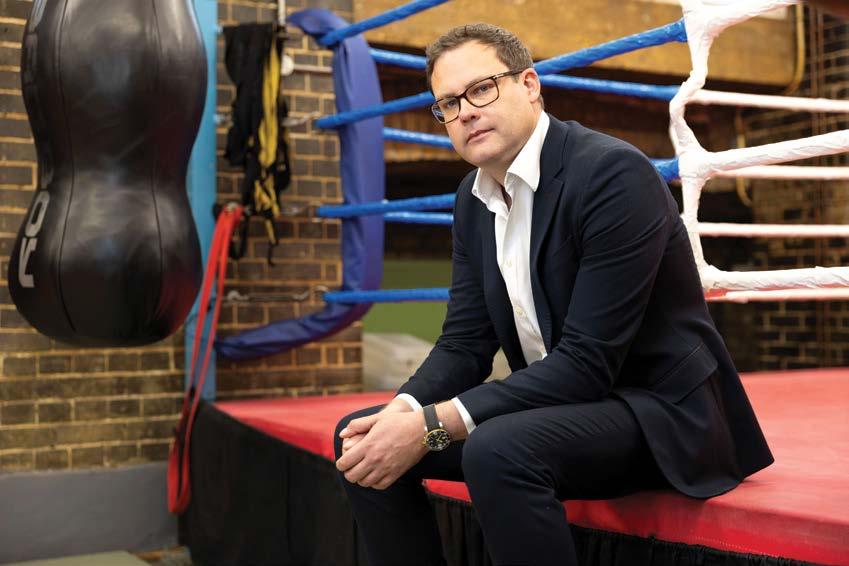
From Welsh football to American wrestling, Rob Edwards is building community-first sports ventures that defy conventionand geography. by ENTREPRENEUR UK STAFF
When Rob Edwards took over a struggling Welsh football club during COVID-19, many would have questioned the timing - let alone the location. Six hours away, with no prior experience in football management, Edwards was flying blind. Yet five years on, Haverfordwest County AFC has not only qualified for European competition twice but also built one of the strongest youth programmes in the country.
Now, the founder of Morley Sports Management is turning his attention across the Atlantic to breathe new life into Ohio Valley Wrestling, a cult US promotion once home to the likes of John Cena, a 17-time WWE world champion wrestler and Brock Lesnar, an American professional wrestler. His mission? To rewrite the rules of modern sports ownership through community values, clear vision, and relentless momentum. His biggest challenge?
“Taking over a football club during a global pandemic. I live six hours away. I couldn’t get there, and I’d never had any experience of running a football club…. but I knew instinctively it had potential,” Edwards recalls. “I knew I was never going to relocate, so from day one I had to invest in people. If people don’t buy into the values, they don’t stick around very long. But if they do, you can build something with a clear vision.”
Building that team has been central to Edwards’ approach. “We’ve built the best off-field team I could have hoped for – people who are passionate and dedicated and who’ve completely bought into our dream. It’s the same now with OVW in Kentucky. It’s a long way away again, a lot of passionate people, but it lacked clear direction. The job is to empower people, put them in
“
You need to stay calm and logical. Not everything goes your way – and when it doesn’t, the worst thing you can do is get flustered. I tend not to get too up or too down. I’ve always kept that middle ground”
the right places, and give them credit for what they achieve.”
Edwards’ entrepreneurial journey is marked by pragmatism and steadiness in the face of challenges. When setbacks come, he keeps a steady head. “You need to stay calm and logical. Not everything goes your way – and when it doesn’t, the worst thing you can do is get flustered. I tend not to get too up or too down. I’ve always kept that middle ground. If you walked past me after a major success or a big loss, you probably wouldn’t notice a difference. That’s always been my demeanour.”
Financial backing came largely from Edwards’ prior career in finance. “There’s been minimal outside investment. Most came off the back of my previous business and my career in finance. The barrier to entry for Welsh football isn’t huge, it’s very accessible – financially and structurally. It gave us

the opportunity to step in and try to build something different from the ground up.”
The same entrepreneurial mindset is driving Edwards’ latest venture with OVW. “Because of our experience with Haverfordwest County AFC in Wales, we saw a similar opportunity with OVW in Kentucky. It’s an under-appreciated asset in the industry in modern times, but there’s massive potential.”
His advice to aspiring founders? “Have self-confidence and be openminded. When I took over the football club, I had no background in it, but I trusted my instincts. I used experience, common sense, and values that mattered to me. That’s been the foundation. We’re trying to build businesses founded on community and social impact. With those fundamentals in place, commercial success will come. You’ve got to believe in what you stand for. If you stay true to your values inside and outside of business, you can build something meaningful.”
For Edwards, motivation comes from the thrill of constant innovation. “I need stimulation. I’ve never been able to sit still. I wake up when the sun comes up and my brain kicks in – I’m raring to go. I’m impulsive. If I get an idea in my head, I’m all in. What keeps
me going is being disruptive, pushing things forward, coming up with new ideas and concepts. With both the football club and OVW, we’re constantly evolving – and on top of that we’ve got consultancy work and partnerships with sporting brands. That forward momentum is what wakes me up in the morning. There’s always a new problem to solve.”
Ultimately, Edwards believes success hinges on leadership and trust. “Be confident in your ability – if you’re leading a business and people don’t buy into you, it won’t work. People buy in to people. Investment in people is 100% at the heart of our model. We’re not always on the ground, so we need to trust the teams to run with the vision. But we also lead from the front – if you want people to dive into the trenches, you need to be the one starting the charge. I’m quite demanding, but only because I hold myself to that same standard.”
Edwards is a rare breed of entrepreneur – one who builds across continents and cultures, grounded in community values and driven by relentless momentum. Whether in Wales or Kentucky, his unconventional playbook is quietly reshaping what modern sports ownership can look like.
Entrepreneur James Caan on judgement, leadership — and why UK start-ups need more than hype to survive.
by PATRICIA CULLEN
AI is no longer the future. It’s the baseline. But while tech entrepreneurs pivot, scale and scramble for relevance, James Caan CBE remains focused on something more enduring: judgement. “The edge that can’t be replicated is judgementspecifically, commercial instinct based on lived experience,” he says. “AI can process a million data points, but it still can’t weigh reputational risk, read a room in a board pitch, or decide whether a client is bluffing in a negotiation.” It’s the kind of thing you expect from someone who’s spent decades navigating the peaks and pitfalls of business - not from a spreadsheet, but from the seat at the table. And while generative AI and predictive intelligence dominate headlines, Caan is more interested in how technology rewires the foundations of business strategy - not just its surface.
AI isn’t a tool. It’s a test. “The blind spot is failing to integrate AI at the strategic level, not just operationally,” Caan, British entrepreneur and former investor on the BBC show Dragon’s Den, warns. “Too many founders treat AI as a bolt-onautomating emails or improving customer service - instead of rethinking how AI could fundamentally reshape their business model.” The shift is already happening. “If you’re not embedding AI into your product development, commercial strategy, or market positioning, you’re behind the curve.” And the answer? Not just hiring a head of data science - but raising the bar on fluency at the top. “Build AI fluency in your leadership team. Not everyone needs to code, but everyone needs to understand

where AI creates value. Create a roadmap for where automation or predictive intelligence can streamline costs or open new markets. Waiting for a ‘perfect use case’ is a delay you can’t afford.”
Conviction beats perfection
So what separates the entrepreneurs who adapt from those who lead? It’s not charm. Or vision. Or even ingenuity, he argues. It’s belief. “It’s not charisma or creativity - it’s strategic conviction,” Caan says. “The ability to make bold decisions early, without waiting for perfect evidence.” And in a world where certainty is a myth, those who hesitate fall behind.
“In 2025, with markets moving fast and signals constantly shifting, leaders who wait to be


100% sure are already too late.” He cites Deloitte’s Human Capital Trends: “Leaders who demonstrate high decisiveness outperform their peers in innovation-led growth by 34%. That’s a meaningful margin - and it’s not about being reckless, but about being resolute.”
Still, no one does it alone Caan isn’t pretending vision alone builds companies. His obsession - one he returns to frequently - is team building. “Your business is like a ship embarking on a journey. Your team
members are your crew. If they work well together, know their roles, and communicate effectively, they can navigate through rough seas and reach your destination.” And the opposite? “If they’re not aligned, the ship can easily veer off course or, worse, sink.”
That means clarity from day one. “Ensuring everyone is pulling in the same direction is crucial.
In a start-up, you need everyone aligned with the company’s vision and goals. This alignment means that every decision, every action taken by the team, contributes to the larger objective.” The best founders, he says, invest in people as much as products. “It’s not just about finding people with the right skills – they need to fit in with your com-
pany’s culture too. When everyone gets along and shares the same values, teamwork happens naturally.”
And, crucially, they make growth part of the job. “Always encourage your team to keep learning and growing. This shows you care about their future and helps them improve their skills. When people feel valued and see that you’re investing in them, they’re more motivated and loyal.”
For all the talk of grit and instinct, Caan’s focus eventually returns to what many UK founders quietly admit: funding here is harder. And for scale-ups? Brutal. “If I could push one policy lever, it would be this: double down on early-stage capital
incentives, especially through scale-ups,” he says. “The UK has great seed-stage support, but we lose too many high-potential businesses between Series A and Series C.”
It’s a familiar point - but Caan wants sharper action: “We should look at enhancing the EIS cap from £1m to £3m per investor, extend reliefs to professional investors, and allow UK pension funds to direct a larger portion into early-stage innovation - similar to recent reforms in Australia and Canada.”
The stakes are high. “Start-ups are already contributing significantly: in 2025, UK start-ups are responsible for 17% of net new private-sector jobs, but many are constrained by capital drag. Smart policy now would compound long-term returns
MILLION DATA POINTS, BUT IT STILL CAN’T WEIGH REPUTATIONAL RISK, READ A ROOM IN A BOARD PITCH, OR DECIDE WHETHER A CLIENT IS BLUFFING IN A NEGOTIATION”
for the economy - not just founders.”
Big ideas, small circles He namechecks Revolut and BrewDog as examples of start-ups who understood that culture and autonomy weren’t extras - they were engines. “Revolut placed a strong emphasis on building a team that was agile and innovative,” he says. “They created cross-functional teams that could work independently on different projects, promoting a culture of autonomy and accountability.”
Of BrewDog: “BrewDog’s founders built a team that shared their passion for beer and innovation. They introduced the ‘Equity for Punks’ programme, which turned their customers and employees into shareholders, creating a deep sense of ownership and loyalty.” Caan’s recipe for success is disarmingly simple: hire for culture, invest in growth, make space for ideas - then get out of the way. “True innovators don’t hedge every move. They make the call, commit resources, and create alignment. In uncertain times, the decisive get momentum — and momentum beats perfection every time.”
For all the talk of AI
and capital strategy, what Caan returns to - again and again - is something curiously human: clarity. In a world where everyone’s shouting, it’s hard to hear what matters - and clarity of thought, values, and action becomes not just useful, but rare. And rare things, in business as in life, hold value. AI will keep accelerating, changing how companies are built and scaled. But Caan sees it less as a silver bullet, more as a mirror. It reveals what’s already strong, and exposes what’s weak. In companies where purpose is vague or leadership brittle, automation won’t save them. In those with vision, cohesion and courage, it becomes a force multiplier. Yet what lingers from a conversation with Caan isn’t just strategy or systems. It’s a kind of seasoned calm. He’s not seduced by the flash of innovation for its own sake. He’s seen too many cycles, watched too many “next big things” become footnotes. What lasts, in his world, is consistency: founders who know what they stand for, teams who trust each other, companies built with longevity in mind. That’s why his call for a smarter funding
policy isn’t just about unlocking cash - it’s about protecting momentum. The UK has no shortage of ideas or talent. What it sometimes lacks is the long-range thinking to let those ideas breathe. Scaling, after all, isn’t just a phase - it’s a leap. One that needs more than seed capital and slogans.
Still, for all his credentials, Caan is not nostalgic. He speaks the language of today’s founders fluently: digital-native, growth-minded, globally alert. But his advice resists trendchasing. Instead, it lands somewhere quieter - and arguably more radical. Build deliberately. Invest in people. Don’t wait for the perfect moment. Use technology, yesbut don’t forget why you’re building in the first place. Because in the end, Caan isn’t betting on AI. He’s betting on judgment - not the loudest voice in the room, but the steadiest. In an era defined by velocity, he offers something rarer: a framework for staying clear-headed when everyone else is pivoting. And maybe that’s the new edge - not just knowing where the world is going, but having the nerve to build something solid while it’s still moving.

How HSBC is supporting the next generation of UK entrepreneurs. by
PATRICIA CULLEN
The pace of change has never been as fast as it is right now –and yet it will never be as slow as it is today.” Tom Wood, Head of Business Banking at HSBC UK, leans forward slightly as he delivers this line – part observation, part call to arms. In an economy still finding its feet after the seismic shocks of Brexit, Covid-19, and inflation, it’s a quote that feels particularly apt. For UK entrepreneurs, uncertainty has become a constant. But so too has the need for evolution - in business models, funding strategies, and the role of their banking partners.
As the Head of Business Banking for one of the world’s largest financial institutions, Wood is clear-eyed about the weight of this
well as the broader economic environment.”
This is not merely marketing speak. In recent years, HSBC has sought to reposition its role in the entrepreneurial ecosystem - not just as a lender, but as a partner. “This is where
pandemic, UK SMEs have endured unprecedented levels of change; from navigating the post-pandemic recovery to rising energy costs, inflation and most recently tariffs,” Wood says. “At the same time, in many industries, innova-
MY TEAM INTERACTS WITH OVER 75,000 SMALL BUSINESS
EVERY SINGLE YEAR. WE REALLY DO UNDERSTAND HOW CRUCIAL ACCESS TO INSIGHT, GUIDANCE, AND SUPPORT IS - ESPECIALLY FOR FOUNDERS AND ENTREPRENEURS AT THE START OF THEIR JOURNEYS”
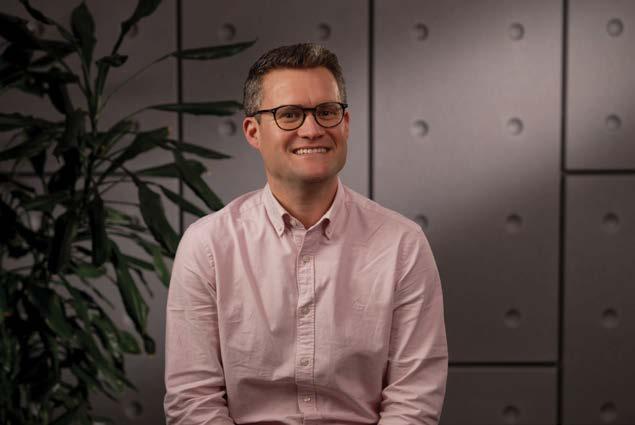
→Tom Wood, Head of Business Banking at HSBC
moment. “The UK’s entrepreneurs have been looking to their banking partners for guidance navigating the fast changing and uncertain geopolitical environment,” he says. “To do this, banks need to have strong relationships with their clients built on foundations of trust and understanding; both in terms of the entrepreneur’s business as
HSBC really excels,” Wood says, “bringing global insight to local business is where we come into our own.”
Few have emerged from the pandemic unscathed, and for small and medium-sized businesses (SMEs), the aftershocks continue to reverberate. “Since the
tion and technology (such as AI) has made it easier for new entrants to enter and disrupt markets, forcing entrepreneurs to evolve their business models to defend against competitive threats and meet the ever-increasing expectations of their customers.” It’s a daunting list, but Wood is quick to praise the businesses HSBC works with. “Despite the above,
the UK SMEs that we work with have shown incredible resilience through this period. Support and guidance through periods of uncertainty is one of the key ways that we look to support SMEs at HSBC.”
Resilience alone, however, isn’t a business strategy. Recognising the challenges SMEs face, HSBC recently launched a new initiative to provide more structured support. “That’s why we’ve recently launched the HSBC Small Business Growth Programme – designed to help small business owners not just survive but thrive,” says Wood. “Built in partnership with Microsoft, WIRED Consulting and UpSkill Universe, the programme will provide business owners with practical and engaging tools and resources on topics that matter.”
The initiative stems from what Wood describes as “countless interactions” with entrepreneurs across the country. “My team interacts with over 75,000 small business owners every single year,” he says. “We really do understand how crucial access to insight, guidance, and support is - especially for founders and entrepreneurs at the start of their journeys. That’s exactly why we created our Small Business Growth Programme; to help early-stage businesses grow with confidence, backed by the right expertise.”
HSBC HAS BEEN AROUND FOR 160 YEARS – THE WORLD HAS CHANGED A LOT IN THAT TIME AND SO HAVE WE. ONE OF THE KEYS TO OUR SUCCESS AND LONGEVITY HAS BEEN THE ABILITY TO ANTICIPATE, EVOLVE AND DELIVER, FIRST AND FOREMOST, CLIENT-CENTRIC SOLUTIONS”

THE FUNDING CHALLENGE - AND WHY IT’S NOT WHAT YOU THINK
Access to finance remains one of the most frequently cited challenges among early-stage businesses — but according to Wood, the issue is more nuanced than a simple lack of available funding. “Access to information, business networks and role models are the main themes I hear when speaking regularly to small business,” he explains. “Access to finance is of course another barrier, but the issue here is
more about knowing what is available and appropriate for a business at their stage of growth rather than lack of availability.”
Education, Wood argues, is crucial. “It’s about matching the right funding solution with the stage that the business is at and the founders’ ambitions. Speaking to a bank or other advisors can help entrepreneurs work out what is right for them.” That’s why HSBC is putting boots on the ground, investing in local expertise. “We have
dedicated Business Specialists on hand in local communities to help business owners to better understand their options and make more confident decisions.”
REINVENTING THE BANK-ENTREPRENEUR RELATIONSHIP
For a bank with a 160-year history, innovation can’t just be a slogan - it must be a structural reality. And HSBC is keen to demonstrate how it’s evolving its own approach. “We are
relaunching our Business Banking Proposition for UK SMEs in a big way with the HSBC Small Business Growth Programme,” Wood says. “Alongside this, we are actively reviewing our product and proposition offering, with input from customers, to ensure the solutions that we offer meet the needs of SMEs.” This includes a diverse range of funding models tailored to different stages of business growth.
“For small businesses with simple needs, our focus is to make it easier and quicker to access our finance solutions,” says Wood. “For the more complex growing business, it’s about how we adapt some of the solutions that we already make available to our corporate or international clients, expanding the product availability and tailoring the product features to make them more suitable for the SME market.”
As inflation and rising costs continue to squeeze margins, HSBC is also focused on offering hands-on help. One example? Business reviews. “A key part of our strategy at HSBC is to provide entrepreneurs more access to dedicated specialists on the ground, in local communities,” says Wood. “SMEs can book in for a Business Review, virtually or in person, with one of over 100 business specialists in all regions across the UK.” These reviews aim to give founders not just financial
For the more complex growing business, it’s about how we adapt some of the solutions that we already make available to our corporate or international clients, expanding the product availability and tailoring the product features to make them more suitable for the SME market.” “
insight, but a clear-headed understanding of their options in a volatile environment. “HSBC’s Small Business Growth Programme is packed with practical tools and resources to help SMEs to become more resilient and succeed,” he adds.
As start-ups increasingly build with sustainability and digital transformation in mind, the banks that support them must also evolve. Wood believes HSBC is prepared for what’s coming. “HSBC has been around for 160 years – the world has changed a lot in that time and so have we,” he says. “One of the keys to our success and longevity has been the ability to anticipate, evolve and deliver, first and foremost, client-centric solutions.” Listening, he says, is more important than ever. “Listening to what our clients are telling us, understanding where the market is going and sharing that insight is key,” Wood
says. “This approach has served us well in the past and will no doubt serve us well in the future, supporting the next generation of UK entrepreneurs.”
In an age of relentless change, UK entrepreneurs aren’t short on challenges - rising costs, technological disruption, supply chain uncertainty. What many are short on is time: time to think, to plan, to breathe. For all the talk of agility and innovation, what often matters most is something more grounded - access to good information, a reliable sounding board, and people who actually understand the pressures of running a business right now. That’s the shift Wood wants to see in the banking world: less focus on selling products, more on showing up. If HSBC’s new direction is to mean anything, it will be in how well its teams embed themselves in real business communities - not just with webinars and toolkits, but with a lived understanding of what it means to grow a company when the margins are tight and the path is unclear.
There’s no shortage of
ambition in the UK’s small business sector. But ambition doesn’t flourish in a vacuum. It needs networks, access, encouragement - and sometimes just a conversation that doesn’t start with a sales pitch. Of course, banks alone won’t fix the systemic issues UK entrepreneurs face. But they can make the road a little less lonely - especially if they remember that relationships aren’t built through apps, but through attention. It’s about listening before advising. And in a sector where too much support arrives too late, that might be a quiet kind of progress worth paying attention to.
In an era where speed is the only constant, Wood’s parting message is one of cautious optimism - and an invitation. “Banks must keep up,” he says. “Trying to be as simple and agile as possible and focusing on our customers is one of the ways that we are doing this in my team within SME Business Banking at HSBC.” In an unpredictable world, that may be just what the UK’s entrepreneurs need to hear.
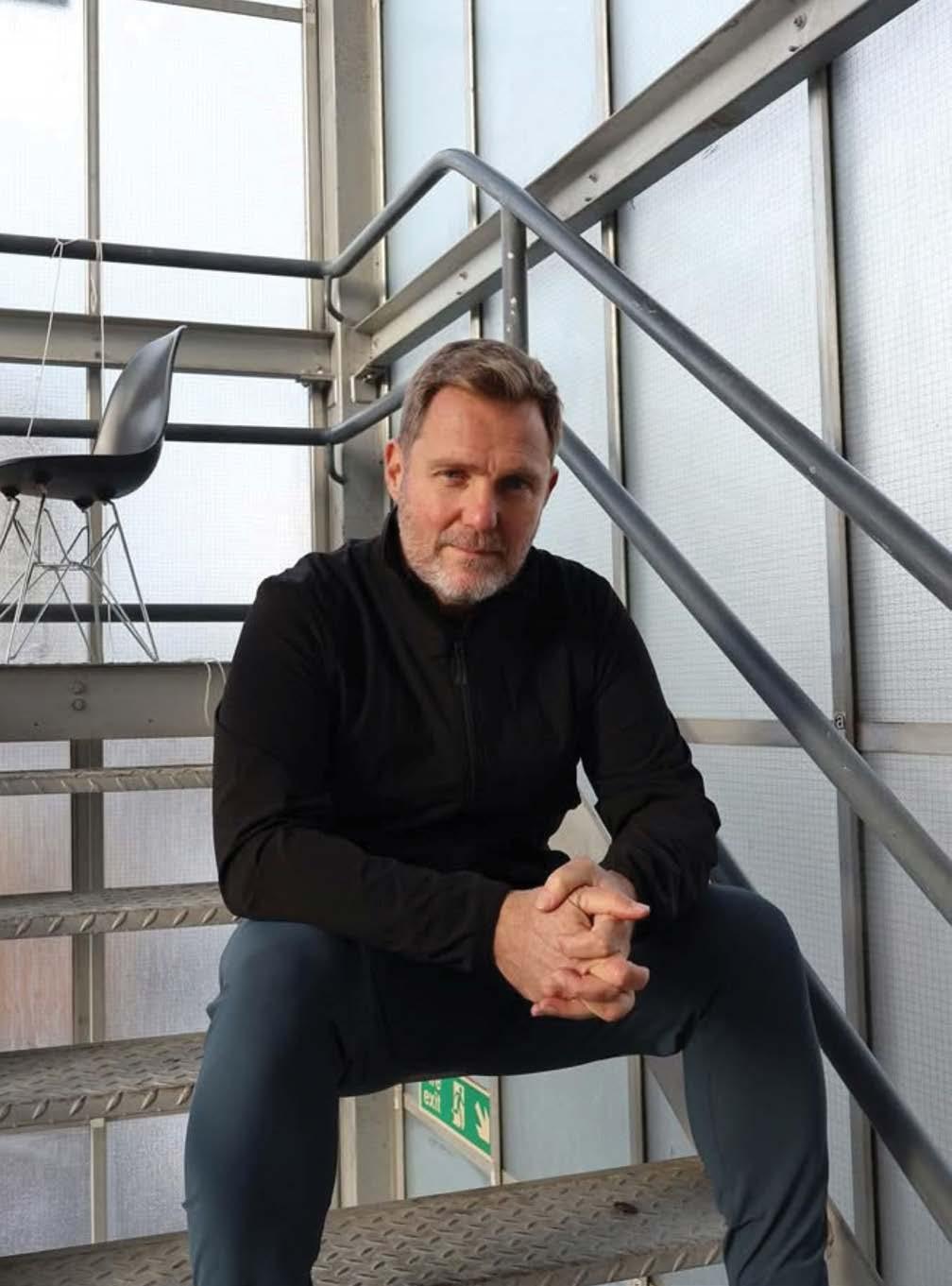
→ Entrepreneur and educator Simon Squibb in conversation
When Simon Squibb knocked on a stranger’s front door at age 15 and asked if he could tidy their garden, he wasn’t chasing a dream. He wasn’t pitching a side hustle or escaping a corporate grind. He was homeless, grieving, and desperate. That unplanned knock would become the start of a long entrepreneurial career — not driven by strategy, but survival.
How a teenage gardener found purpose in business and keeps growing it his way.
by PATRICIA CULLEN
“I started a gardening company with no website, no brochure, no sales experience, having never started a business before in my life,” he recalls. “And the reason that I started that business isn’t because I wanted to be an entrepreneur, or I even knew what it was… I just had no choice.”
Squibb, the founder and CEO of HelpBnk - a community-powered startup support platform with over 250,000 members - is now widely recognised as an entrepreneur, investor, author, and energetic advocate for founders who don’t fit the typical mould. His TikTok-style videos giving away mentorship, equipment and cash to aspiring business owners rack up millions of views monthly.
But the roots of Squibb’s mission lie far from the glow of internet virality. They’re grounded in loss, instability, and a deep sense that the UK system isn’t built to help the people who need it most.
When Squibb was a teenager, life unravelled quickly. “My father died suddenly when I was 15 years old. And not long after that, my mum and I had an argument. And my mum kicked me out of home, which meant I suddenly had to fend for myself and figure out how to make it in the world.” Despite spending 12 years in school, Squibb felt wildly unprepared. “It had never been mentioned to me what an entrepreneur was, or how I could become one… I didn’t know how money worked. I didn’t know how anything worked. The only thing the school system really taught me was that one day I was expected to get a job.”
But that wasn’t even an option. With no national insurance number and no fixed address, job applications were impossible. “I tried. And I just couldn’t get a job. So then I went to social services. And they told me just to go back home, which I couldn’t do either. So I was stuck, really.” That’s when something shifted. “I call this moment the moment the entrepreneur muscle woke up in my brain. For the first time, I had to use it. We all have it. But I had to use it for the first time.”
He spotted a large house with an unkempt garden. “Maybe the people with the nice big house will pay you to tidy up their garden,” he thought. “And so I, through needing it, not just wanting it, found the courage to walk up the path.” The owner said yes. And a business - albeit short-lived - was born. “It went on to fail. But I had an amazing experience the next eight months trying to make a gardening company work. And that was my first experience as an entrepreneur.”
That early necessity-led venture eventually evolved into a more deliberate path. Squibb would go on to launch and sell multiple companies, including Fluid, a creative agency in Hong Kong that saw
significant success. But it wasn’t until later that he found what he now sees as the real engine of long-term motivation: purpose.
“When I was younger, I didn’t really have one belief. I just needed to survive… I think as I’ve

People only regret what they don’t do, not what they do do… If you don’t try something, you’ll have a regret. And if you do try and it fails, you’ll have a good story”
gotten older, I’ve come to realise that the businesses that drive me the most are ones that have purpose, ones that matter more than me.” It was at Fluid, a company based in Hong Kong, that this lesson crystallised. “It was going really well, but people were leaving and I wondered why. And then I realised that it was because the company was just there to make money.” So he made a change. “I wanted to make it about the thinkers and the creatives and not just about making money… giving them the time to be creative and making sure they’re paid well.” For Squibb, the best businesses now aren’t necessarily the biggest - they’re the most meaningful. “I think the purpose of life is a life of purpose.”
Of course, preaching purpose in a world obsessed with monetisation doesn’t come easy. “Even now with what I’m doing, a lot of people judge me. It’s like, ‘Oh, you’re just doing it for views, you’re just doing it for likes.’ And I’m permanently defending myself saying I’m doing it to help people enjoy their work and give people more options than just getting a job.”
That’s one of Squibb’s loudest critiques of the UK system: it pushes everyone toward a narrow version of success. School. University. Job. Stability. But there are so many more possibilities. His book, What’s Your Dream?, is a manifesto for this mindset - an invitation
I’D LOVE TO MAKE JOB CENTRES INTO DREAM CENTRES.I’D LOVE TO REDESIGN THEM AND MAKE THEM PLACES WHERE PEOPLE CAN GO AND LEARN HOW TO DO WHAT THEY LOVE… GIVE THEM THE TOOLS, THE FUNDING AND NETWORK TO MAKE THAT HAPPEN”
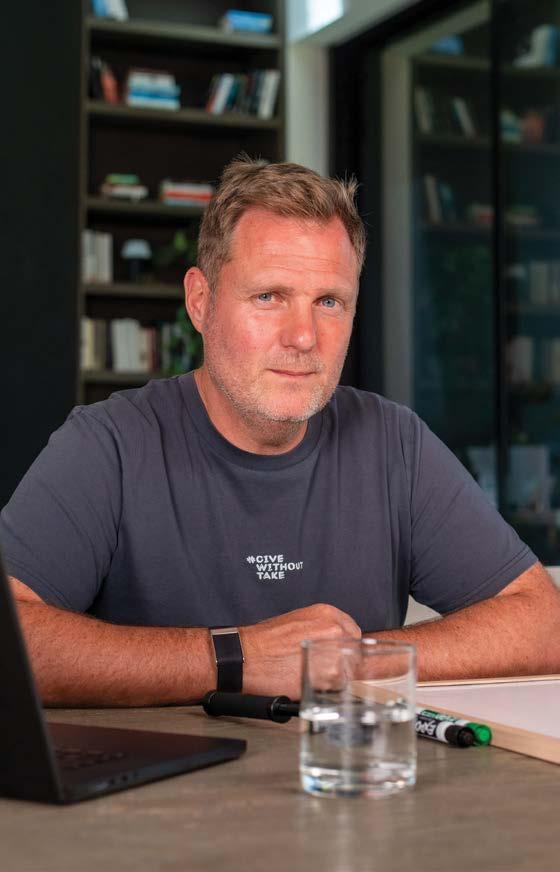
to dream first, strategise later. He says, “People only regret what they don’t do, not what they do do… If you don’t try something, you’ll have a regret. And if you do try and it fails, you’ll have a good story.”
Squibb’s advice to UK entrepreneurs varies depending on life stage, but the message is clear: if you’re young, take the leap now. “If you’re single, and you’ve got a job, the likelihood is if you quit that job, you could get another job… you don’t realise how much time you’ve got, how much freedom you’ve got. So when you’re young, I think you should really just take every bit of risk you can.”
Cost is the killer, so he recommends keeping living expenses low. “Live at home if you can while you get your dream off the ground. Give yourself a solid runway - six to twelve months - with low living costs and some savings to support the journey.”
For those with more responsibilities? It’s harder but this is no excuse. “Kids don’t do what you say, they do what you do,” he says. “If you want them to dream, you have to dream.” }}
MY BIG DREAM
TO FIX THE
SO THAT
AS YOUNG AS 4 OR 5 YEARS OLD. I WANT TO POWER THAT UP, INVESTING FURTHER IN HELPBNK.COM, INVESTING IN EDUCATION-RELATED PLATFORMS AND BUSINESSES”
Asked what he would do if he had £500 and no contacts in the UK today, his answer is unequivocal: social media. “It’s the new TV. My channel gets half a billion views a month. We haven’t ever paid for a post, sponsored a post. Everything’s organic.” He advises putting that £500 into making one great piece of content - something that informs, entertains or sells. “I’d sell something in that video to generate the money back… with AI, it’s getting cheaper.”
While London remains the gravity centre of UK entrepreneurship, Squibb thinks smaller towns like Tunbridge Wells are quietly generating the next wave. “It’s one of the few towns where the old high street is doing better than the new high street.”
He recently helped restore a historic water fountain in the area - not just as a civic act, but as a bet on localism. “I believe we’re returning to a time when we value genuine connections with people and communities. I have quite a few friends now in Tunbridge Wells who are building businesses.” But the real start-up hub? “These days the best hub is online. I have a
→The entrepreneur Simon Squibb, thinking beyond the usual
platform called HelpBnk.com with 252,000 entrepreneurs on it… you have to go where the community is.”
Ask Squibb what he’d redesign in the UK’s start-up ecosystem and his answer is blunt: “I’d love to make job centres into dream centres.” He believes these spaces have become lifeless and bureaucratic - not built to inspire, but to contain. “I’d love to redesign them and make them places where people can go and learn how to do what they love… give them the tools, the funding and network to make that happen.” This vision - of accessible, empowering spaces for anyone with an idea - sits at the heart of his platform HelpBnk. It’s designed for the people the ecosystem usually ignores: the non-technical, non-venture-backed majority.
“There’s 60–70% of the population that would love to start their own business but don’t have any funding. They can’t afford a course. And they don’t have a business that necessarily people want equity in.”
Whether it’s a dog-walking venture, a bakery, or a flower business, he believes these “bottom of the pyramid” start-ups deserve support. “No one’s really servicing that part of the ecosystem because there’s no money in that ecosystem… so I’m helping that sector for free.” Everyone wants to see unicorns and more successful businesses in the UK, but that means we have to encourage more people, particularly the younger generation, give them the tools, the capital and the support to start something. “This could create a huge difference in the UK long term, creating an additional sloth of businesses that are investable for the VC market. The unicorns of the future.”
Winning $1m at the One Billion Summit supercharged Squibb’s ambitions - especially around education. The entrepreneur challenges the idea that entrepreneurship is only for the privileged, has built multi million pound businesses and asked thousands of people to name their dream. His own? “My big dream is to fix the education system, so that schools include business education and financial literacy for students as young as 4 or 5 years old. I want to power that up, investing further in HelpBnk.com, investing in education-related platforms and businesses.” If he gets his way, future generations won’t need to stumble into entrepreneurship by accident - they’ll be taught to dream, build, and believe from the start. And if you’re young right now? You’re luckier than you know. Because if Squibb realises even half of his vision, the world you’ll be starting up in will be fairer, freer, and finally built with you in mind. Now that’s what I call dreamy.
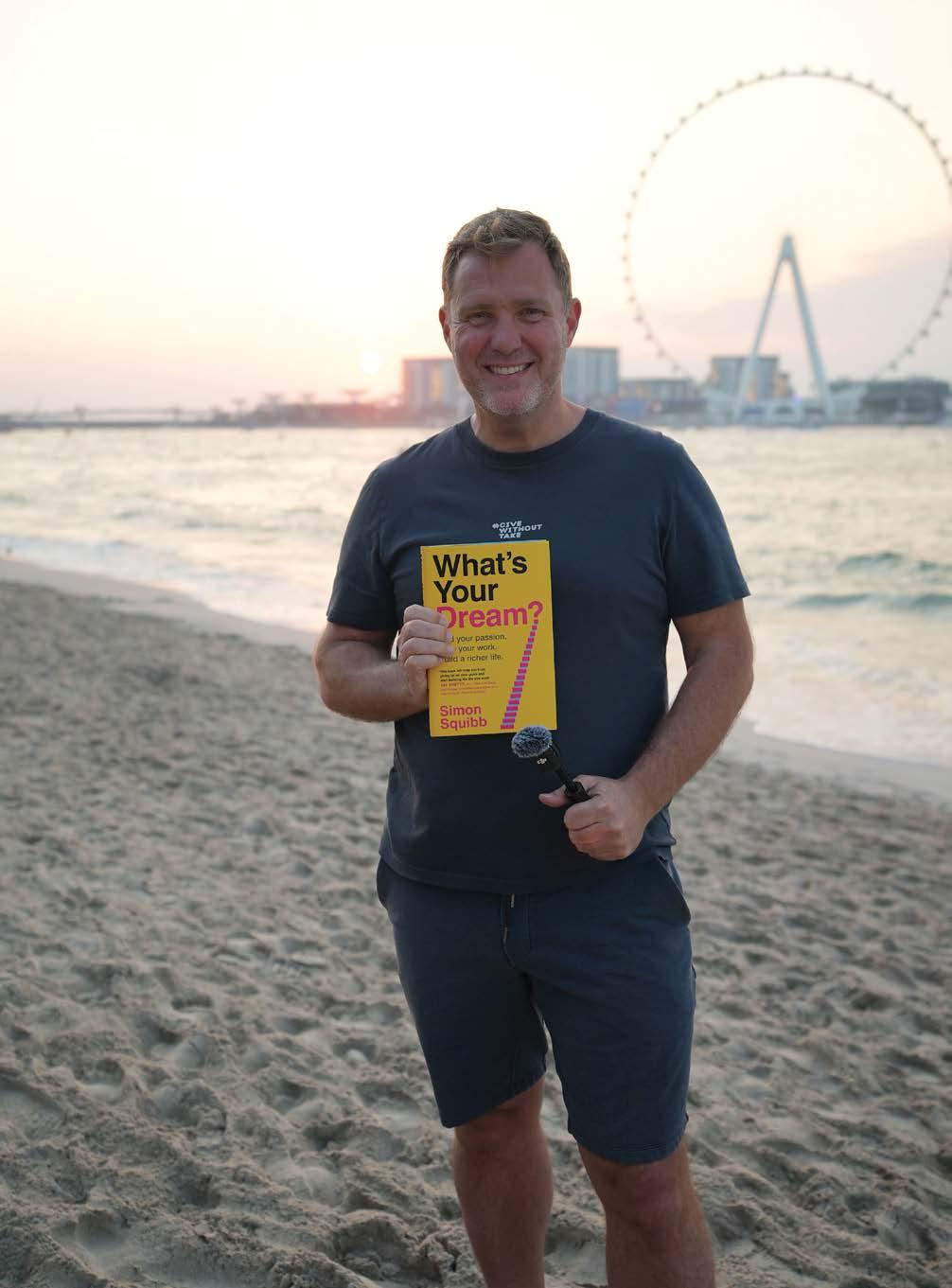








by CALLUM SCOTT




After a year of high interest rates, stricter lending rules and a shaky economy, 2025 has made it a lot harder for small businesses to get the funding they need. According to the British Business Bank, just 43% of smaller businesses successfully secured external finance in Q2 2024, down from 50% the year before. And even when businesses are referred to alternative lenders through the UK’s bank referral scheme, only 1 in 20 actually get funding. So it’s no surprise that applying for finance has become not only more complicated, but much more competitive.
The drop in approval rates is mostly due to how uncertain the economy still feels, and because lenders are being more careful about who they say yes to. Even though the UK economy grew by 0.9% in 2024, it’s still only 3.2% above where it was before the pandemic, which is one of the slowest recoveries in the G7 countries. That kind of slow progress makes lenders nervous, so they’re
looking more closely at each application and only backing businesses that can show they’re stable and low risk. Adding to the challenge is a big shift in where Small and medium enterprise (SME) lending is actually coming from. In 2024, 60% of business lending came from outside the major high street banks, the highest level on record. Challenger banks and specialist lenders are stepping in to fill the gap, but they’re also being picky. Even though total

Relying too much on an overdraft, paying suppliers late, or filing your accounts with Companies House after the deadline can all make lenders nervous” “
In today’s cautious and competitive lending environment, ambition alone isn’t enough to secure funding. Lenders want to see that your business is financially sharp, well organised and has potential to grow, without being risky”
lending to SMEs hit £62 billion last year, most lenders are now backing businesses that can show they’ve got their finances in good shape, with solid planning, stability and a clear ability to repay what they borrow.
Even businesses that are bringing in decent revenue are getting turned down for finance, and it’s often because of small things that raise red flags. Relying too much on an overdraft, paying suppliers late, or filing your accounts with Companies House after the deadline can all make lenders nervous. These things signal that the business might not be managing its money well, which makes it harder for
lenders to trust that a loan will be repaid on time.
Cash flow is still one of the biggest challenges for SMEs, and late payments are a major reason why. A 2023 study found that 27% of small businesses in the UK were owed between £5000 and 20,000 in unpaid invoices, and more than half said the problem had got worse over the year. When you’re waiting on that much money, it puts a lot of pressure on your cash flow. And when lenders see those kinds of issues, it can make them question how sustainable or stable your business really is.
A lot of SME owners think that as long as their revenue is growing, they’ll have no trouble getting funding. But in reality, lenders are looking at the bigger picture. Things like steady cash flow, consistent profits and whether you can realistically keep up with repayments all matter more than just how much money you’re bringing in.
In 2024, loan approvals rose by 23% to nearly 45,000, and overdraft approvals jumped by 47% to just under 59,000. But that doesn’t mean it’s suddenly easier to get finance, it just shows that more businesses are applying. Lenders are still being selective. What they really want to see is a business that’s clear about its numbers, has a solid plan, and can show how it’ll repay the money. A steady cash flow forecast, an up-to-date balance sheet, and a clear repayment plan will go further than fast
growth that hasn’t been backed up by structure or strategy. The problem is often timing. By the time most SMEs apply, it’s already too late to fix the numbers. Getting lender-ready starts six to twelve months earlier. You need to show that you’re not just making money, but managing it well.
One of the biggest barriers is that SMEs aren’t applying for funding at all. In 2023, only 3.5% applied for new or renewed finance, and just 26% looked for external advice about their financial position. Fear of rejection or uncertainty about where to start plays a big role, but without guidance, businesses often don’t realise they’re underprepared until they’re already in front of a lender. By that point, it’s usually too late to fix the gaps.
Even when businesses do apply, simple mistakes can hold them back. Outdated financials, projections that are too vague to be useful, or skipping over weaknesses in the hope they’ll go unnoticed can all hurt your chances. With lenders being so selective, these things can quickly lead to rejection. Underinvestment is another common issue. 58% of SMEs who felt they hadn’t invested enough blamed the high cost of credit, while 55% said they couldn’t borrow at a fair rate. But often, it’s poor planning and messy finances that are really getting in the way.
IF YOU WANT TO IMPROVE YOUR CHANCES OF GETTING FUNDING, THE WORK NEEDS TO START EARLY, IDEALLY SIX TO TWELVE MONTHS BEFORE YOU APPLY. THAT MEANS CUTTING BACK ON OVERDRAFTS, PAYING SUPPLIERS ON TIME, KEEPING YOUR BOOKS AND FILINGS UP TO DATE, AND BUILDING OUT REALISTIC FORECASTS”


If you want to improve your chances of getting funding, the work needs to start early, ideally six to twelve months before you apply. That means cutting back on overdrafts, paying suppliers on time, keeping your books and filings up to date, and building out realistic forecasts. It also helps to look at your business through a lender’s eyes. If you wouldn’t lend to yourself, it’s probably time to tidy things up or bring in expert help. Most importantly, these habits shouldn’t only kick in when you’re actively applying. The businesses




that get a yes in 2025 will be the ones that already look strong on paper, not the ones scrambling to look organised at the last minute. Being lenderready isn’t something you tick off once; it’s a way of running your business. In today’s cautious and competitive lending environment, ambition alone isn’t enough to secure funding. Lenders want to see that your business is financially sharp, well organised and has potential to grow, without being risky. If you understand what they’re looking for, deal with any red flags early, and build solid financial habits ahead of time, you’ll be in
a much stronger position to stand out and get the yes you’re aiming for.

Callum Scott is the founder and Managing Director of Winchester Corporate Finance. With over a decade of experience in the financial sector, he specialises in supply chain finance and is known for his hands-on leadership style. Under his guidance, Winchester Corporate Finance has sourced over £70m in funding for small businesses, offering tailored solutions such as business loans, asset finance and invoice finance.

by ENTREPRENEUR UK STAFF
Public relations is a US$107bn industry that rarely questions its own orthodoxy. Agencies operate on retainer, charge fees upfront, and justify outcomes later. Results are often measured in the nebulous currency of “impressions” or “strategic visibility.” Clients—particularly large corporates—are expected to trust the process. Omar Hamdi does not. The founder of Pathos Communications, a London-based tech-enabled public relations (PR) firm, has spent the past six years challenging the standard model, one invoice at a time. His firm bills clients only after securing coverage in a publication the client values. It is a commercial inversion of PR’s prevailing logic. And it is working.
Since launching in 2019, Pathos has grown to a staff of 60, representing 20 nationalities, and now serves more than 5,000 clients across 53 countries. According to the Financial Times’ FT1000 rankings, it is currently the fastestgrowing advertising and marketing company in the United Kingdom, and the 33rd fastestgrowing European company in any sector. Unlike many of its peers, Pathos has remained consistently profitable and cash-generative. Its clientele is drawn almost entirely from the global majority: small and medium-sized enterprises (SMEs). These account for roughly 90% of all
businesses globally and more than half of employment, according to the World Bank. Yet their presence in mainstream media is disproportionately marginal. “Go to any major news site’s business section,” says Hamdi. “You’ll find political coverage or stories about billion-dollar companies. But where are the SMEs?”
Pathos’s wager is simple: most SMEs will not commit thousands to speculative media exposure, but will gladly pay for tangible outcomes. The company’s “pay-onresults” model depends on selecting stories that are almost certain to succeed. To that end, Pathos has developed a trove of first-party data on over 250,000 prospects and built an internal AI tool—PathosMind—to triage, score, and shape narratives before a human pitch is made.
“We almost always filter failures out at the qualification stage,” Hamdi explains. “By the time a client receives a proposal, we already know it’s publishable.” At the heart of the firm’s approach is a proprietary editorial framework. In 2022, Hamdi developed an internal ontology—a classification system—of publishable story types. “Editors are more predictable than you think,” he quips. “There are only 13 kinds of story. If you want to know what
THERE’S NO DICHOTOMY BETWEEN SUBSTANCE AND STYLE. A PIECE ON FOOD SECURITY IN THE SAHEL IS COMPETING FOR ATTENTION WITH A PHOTO OF KIM KARDASHIAN. IF YOUR STORY ISN’T PRESENTED WELL, NO ONE WILL READ IT— HOWEVER IMPORTANT IT IS”
they are, apply for a job and sign an NDA.” While glib, the underlying proposition is serious: media success is neither mystical nor purely relational—it is patterndriven, and thus increasingly susceptible to algorithmic foresight. PathosMind operationalises that idea.
Some might question whether this model encourages soft or commercially biased content. Hamdi rejects that framing. “There’s no dichotomy between substance and style. A piece on food security in the Sahel is competing for attention with a photo of Kim Kardashian. If your story isn’t presented well, no one will read it— however important it is.”
Pathos’s remit is deliberately narrow. It does not traffic in political campaigns, reputation laundering or contentious lobbying. “What we do is globally uncontroversial,” Hamdi says. “We’re giving a voice to entrepreneurs and growing businesses. No government—except perhaps North Korea— could object to that.”
The company has also avoided the industry’s
penchant for credentialism. Hamdi famously does not read CVs when hiring. “I look for ambition, grit, humility—substance over style. And that’s not on paper. It’s instinct. It’s chemistry. It’s like deciding whether to talk to someone in a café or try on a pair of shoes. The only exception is our finance team - they can’t learn on the job since the margin of error is zero.” His own background is suitably eclectic. Before founding Pathos, Hamdi presented a BAFTAnominated BBC consumer show, was a columnist, and a contributor to Radio 2. He understands the media not just as a commercial platform but as a cultural force—and is now using that understanding to rewire its access points.
The firm maintains direct, commercial relationships with top-tier publications, bypassing the gatekeeping networks that define much of the PR world. Hamdi has never joined a PR trade association or sought admittance to press clubs. “I don’t know if we’ve been excluded,” he says. “I’ve simply never tried to enter.”
While other agencies express scepticism - some
warning publicly against “no-win, no-fee” media firms (a sleight against Pathos, since they are the only one) - Hamdi says they often call privately for help when their own client deadlines loom. “It’s no different from Uber upsetting taxi drivers or PayPal rattling banks,” he notes. “That’s the price of disruption.” Pathos’s long-term ambition is not acquisition or exit, but endurance. “How can you exit a mission this big?” Hamdi asks. “I expect my grandchildren to be collecting dividends from Pathos. My work will be done when media coverage is as essential—and as accessible—for small businesses as having a website.”
In that vision lies the firm’s disruptive strength—and its greatest risk. Pathos is not merely streamlining publicity. It is reconfiguring who gets to participate in public discourse. For now, the firm remains an outlier. But if the rest of the PR industry continues to charge for potential rather than proof, it may soon find itself being recast.
/Strategy
by KAMALES LARDI
AI is developing at a rapid pace and transforming the way global industries operate. As companies accelerate artificial intelligence (AI) adoption in order to stay competitive and reap its potential benefits, the urgency for building AIReady capabilities in the organisation is increasing. The true value of AI-based solutions depends on the teams who understand, challenge, embrace and integrate it wisely. In my


new book, Artificial Intelligence For Business, I highlight the impact of AI on the future of work, specifically the skills gaps and job displacements, as well as future essential skills required in global organisations. For business leaders, building AI-Ready teams means more than just hiring technical experts or data scientists. Success in the AI business landscape means upskilling the workforce to develop five essential capabilities that will enable people to thrive.




SHOULD BE DEVELOPED ACROSS ALL TEAMS IN AN ORGANISATION, INCLUDING HOW AI WORKS, THE DIFFERENT TYPES OF AI SOLUTIONS, HOW DATA IS USED, WHERE BIAS CAN CREEP IN, AND WHAT REAL WORLD APPLICATIONS LOOK LIKE IN THE RELEVANT INDUSTRY”
Knowledge and understanding of AI can seem overwhelming, particularly to those in non-technical roles who may struggle with the constant flood of information about large language models, Python codes and AI platform functionalities. While not everyone needs to have a deep technical understanding for how to

develop AI-based solutions, they should understand what AI can do and where its limitations lie. AI literacy goes beyond a mere understanding of AI technologies. It involves building foundational understanding of its context and value, as well as the ability to question its design and implementation. AI literacy should be developed across all teams in an organisation, including how AI works, the different types of AI solutions, how data is used, where bias can creep in, and what real world applications look like in the relevant industry. Building AI literacy begins with organisational education and training programs that offer executive-level understanding of AI capabilities, limitations and risks, as well as industry-specific applications. Additionally, hands-on experience and real-world applications are critical in developing an understanding AI in a business context. The aim is to raise the level of understanding to ensure every AIrelated business decision is made with awareness and purpose.
As we increasingly apply AI-based technologies in our daily business,
the outcomes can be quite compelling. The potential productivity gains and scale of benefit are driving organisations to implement AI-based solutions across various business functions. The outputs of AI tools may appear clean and professional, but may not always be rooted in accuracy or truth. In addition, there may be hidden biases that could be detrimental, particularly if the outputs are used in critical decision-making processes. AI-ready teams need to develop critical thinking skills – the ability to analyse AI outputs, identify anomalies or biases, and make well-informed decisions relating to its use. As organisations increasingly use AI-based systems, there is a risk of over-reliance and trust on its output, without truly understanding how the outcomes are derived. This is where critical thinking becomes indispensable. Building internal capabilities in ‘data scepticism’, or the ability to challenge assumptions, examine how models are trained, and identify potential errors, anomalies or biases in the output, is critical for organisations. Although a certain level of technical competency may be required to deep dive into the AI-system capabilities, a basic level of confidence to raise concerns
/Strategy
and questions across all teams interacting with AI solutions and outputs will be essential for organisations. Deep technical training is not required for this. More importantly, leadership teams should prioritise building an organisational culture where employees are encouraged to question and analyse AIgenerated insights. For example, establishing scenario-based exercises, diverse team discussions and formalised feedback loops will help sharpen critical thinking skills across the organisation.
As the capabilities of AI-based technologies rapidly advance, the question of whether to replace human resources with AI is becoming increasingly dominant in the global business landscape. In recent months, we have seen several global organisations make headlines as the decision to replace laid-off workers with AI and automation takes centre stage. This includes brands such as Klarna, UPS, Duolingo, Google and Salesforce, among many others. In my experience, the integration of new technologies does not automatically mean replacing people. As we have observed over decades of industrial revolution, technology enables shifts in working environments, taking over tasks and pushing human resources to more complex or different types of work. Albeit AI development is significantly more rapid and its capabilities enable more sophisticated tasks, the cycle of shifting work remains the same. In the AI age, this means creating new kinds of teams where humans and intelligent systems collaborate effectively to deliver cohesive and sophisticated work at an accelerated pace. To support this, companies should focus on role
BUILDING
CAPABILITIES IN ‘DATA SCEPTICISM’, OR THE ABILITY TO CHALLENGE ASSUMPTIONS, EXAMINE HOW MODELS ARE TRAINED, AND IDENTIFY POTENTIAL ERRORS, ANOMALIES OR BIASES IN THE OUTPUT, IS CRITICAL FOR ORGANISATIONS”
redesign, process mapping, and experimentation with AI tools in real workflows. Encourage cross-functional collaboration— between business, tech, and data teams—to break down silos and co-create solutions. The key is to help people see AI as an assistant, not a threat.


With the rise of AI application in business comes a surge of ethical concerns and risks, including bias, data privacy and over-reliance of AI for critical decision making. To leverage AI-based technologies effectively, organisations cannot afford to overlook these concerns, particularly considering the developing regulatory scrutiny and fragility of consumer trust. Every team should receive education and training on the ethical concerns and challenges of AI application in business, including the ability to recognise biases in data and outputs, understanding explainability requirements, and making inclusive decisions. Responsible use of AI should be a foundational part of the organisational culture.
Realistically, this goes beyond formal training programs to enable successful adoption in organisations. Transparent communication, open dialogue, best practices and use cases are needed to explore potential unintended consequences and ensure responsible use is top of mind for all teams. Ethical reasoning should not be designed to slow innovation, but ensure that it is able to flourish within the space of safe and responsible use for the business.
One of the most foundational skills for an AI-ready team is adaptability. Exponential technologies, particularly AI, are developing rapidly and
constantly changing. The most valuable skill in an AI-ready organisation is not the knowing everything, but being curious, open to change and continuously willing to learn. Embedding this growth mindset in how teams work and collaborate gives employees permission to explore new capabilities, learn quickly from failure, and experiment with new tools and solutions within a safe environment. In the current AI age, organisations need to prioritise investments in microlearning platforms that are able to encourage continuous rapid learning, knowledge sharing and reward curiosity. Critically, leadership teams should model this mindset, demonstrating the willingness to evolve and rethink traditional assumptions and limitations. Adaptability will ensure the organisation does not just survive the era of AI transformation, but thrives in it.
AI-readiness goes beyond training programs, certifications and tools proficiency. It is truly a team-wide capability that requires sustainable investment in people. The future of work is not only impacted by the rapid development of AI, but how intelligently organisations are able to prepare the workforce to embrace it responsibly.

Kamales Lardi is the author of Artificial Intelligence for Business and a recognised global keynote speaker on AI transformation
While loneliness is a natural part of the human experience, it remains a silent reality for many in the workplace. Below, five experts share practical ways businesses can tackle loneliness at work to build resilient, more connected teams and improve employee wellbeing and performance.
by ENTREPRENEUR UK STAFF
For Caroline Taylor, co-author of The Neglected Acts of Leadership and Managing Director of The Oxford Group, addressing workplace loneliness should start with building a strong foundation of trust. “When there is not enough trust to support open conversations, leaders are left to speculate about what others might be going through, often missing the real challenges they face at work,” she says. Trust has the ideal conditions to develop in an environment where everyone feels comfortable speaking up with concerns,
asking questions, sharing ideas, and offering alternative perspectives. Achieving this requires an organisational culture deeply rooted in psychological safety. “In the day-to-day reality of leadership, working on psychological safety is rarely straightforward, but it is key to fostering trust,” she adds. Taylor points out that in a volatile, emotionally complex, and at times bewildering world of work, the case for building trust is both compelling and rewarding. “It doesn’t just tackle loneliness. In our work with leaders, we routinely witness improvements in
wellbeing and performance when trust is made a priority.”
Connect with the team
For Archana Mohan, Chief Operations and Technology Officer at Navera Investment Management and author of The Through Line, the antidote to workplace loneliness is connection.
“Our ability to empathise and understand one another is declining,” Mohan says.
“People are longing for genuine connections and a sense of belonging, yet find themselves adrift in an ocean of superficial interactions.”
To counteract this, Mohan urges leaders to reach out to their teams. “Connection is a fundamental human need. It empowers us, motivates us, and allows us to flourish. If, as a leader, you care about those in your charge, you must connect with them.
That is how you make your team members feel valued and visible in the workplace.”
Leaders who intentionally reach out to their employees do more than combat loneliness; they directly influence performance and business success. “To lead effectively, you need to lead with care. Because care creates connection.
Connection fuels commitment. And commitment drives results.
It’s in those moments of real connection that collective brilliance is unlocked,” she concludes.
Sometimes the root cause of worrying levels of loneliness stems from broader cultural issues. When there is no commitment to inclusion and
Archana Mohan, Chief Operations and Technology Officer at Navera Investment Management

TO LEAD EFFECTIVELY, YOU NEED TO LEAD WITH CARE. BECAUSE CARE CREATES CONNECTION. CONNECTION FUELS COMMITMENT. AND COMMITMENT DRIVES RESULTS. IT’S IN THOSE MOMENTS OF REAL CONNECTION THAT COLLECTIVE BRILLIANCE IS UNLOCKED” “

Caroline Taylor, Managing Director of The Oxford Group and co-author of The Neglected Acts of Leadership

Faye Allen, Regional Director at Rimkis
toxic workplace cultures are left unchallenged, people can quickly become isolated and withdrawn. Faye Allen, Regional Director at Rimkis and author of Building Women, encourages leaders to confront workplace toxicity. “If discriminatory language, bullying, harassment, and stereotyping are left unchecked, people will not see the workplace as a welcoming and safe space,” Allen highlights. In traditionally predominantly male industries, like construction, many women often find themselves the only woman in the room, which can further intensify any loneliness experienced. But it’s not just women, with many men facing isolation in the workplace too, especially where a culture of ‘put
“
WHETHER THEY WORK ON SITE OR REMOTELY, FULL TIME OR PART TIME, BUILDING AN INCLUSIVE CULTURE HELPS TO ENSURE PEOPLE DO NOT EXPERIENCE PROLONGED LONELINESS OR LACK OF CONNECTION. WHEN WE PRIORITISE INCLUSION, EVERYONE BENEFITS”
up and shut up’ is frequently seen. Reflected in the high prevalence of suicide in the UK construction industry, it is essential that toxic cultures are dismantled and all employees feel valued and part of the team. “Whether they work on site or remotely, full time or part time, building an inclusive culture helps to ensure people do not experience prolonged loneliness or lack of connection. When we prioritise inclusion, everyone benefits,” Allen concludes.
Provide access to support services
Leaders often feel under pressure to know all the
answers, but it’s okay to be unsure of what to say to someone, notes Lesley Cooper, founder and CEO of consultancy WorkingWell. “The most important thing you can do for your team is to be present, listen, and signpost accessible support,” she says.
Providing a safe, nonjudgemental space for employees to discuss loneliness, things that are troubling them, and ways to manage any negative feelings is crucial. “This could be with a trusted line manager or colleague, but objective support from professional therapists and counsellors should also be accessible to prevent loneliness from manifesting into more serious issues,” she emphasises.
Importantly, leaders who notice increased use of support services should take proactive steps to understand the root causes behind these feelings.
“Doing so can help create a healthier work environment and reduce the likelihood of others needing similar support in the future,” Cooper sums up.
According to Zana Goic Petricevic, founder of Bold Leadership Culture and author of Leading on the Edge, the leaders that are best equipped to help manage feelings of loneliness in their teams are those that are able to tap into what she calls their ‘coaching

consciousness’. “In a world dominated by technological advancement, where work never really stops, managers learning the coaching language may be our last line of defence against disconnecting and losing touch with our humanity. That’s because the language of coaching fundamentally shapes how we show up, for both ourselves and others,” she says. For Petricevic, coaching is a way of truly seeing and hearing one another. “To develop your ‘coaching consciousness’, listen with genuine curiosity, prioritise deep connections, and challenge the ‘normal’ that prevents
Cooper, founder and CEO of consultancy WorkingWell
these connections. Leaders may well need to role model their own vulnerability to create space for others to follow suit,” she explains. “With a coaching consciousness at the heart of leadership skills, leaders can help people reconnect with their identity, work, and purpose,” she says.
Loneliness may be a quiet presence in the workplace, but its impact is anything but small. Tackling it requires more than surface-level gestures—it demands cultural change, inclusive leadership, and a genuine commitment to connection. When people feel safe, supported and heard, workplaces don’t just function better—they become places where people actually want to be.

Goic Petricevic, founder of Bold Leadership Culture and author of Leading on the Edge
by ELLIOT KAY
Let’s be honest, public speaking can feel a little like karaoke night. You want to make an impact, but part of you is just hoping no one throws anything at you or boos you off stage. Or maybe for you public speaking feels a bit like trying to cook in front of a crowd. You know the recipe and you’re hoping that all the ingredients will come together in harmony, but deep down you’re wondering if the whole thing’s about to go up in flames amidst the pressure of everyone watching.

The truth is, you don’t need to be perfect to have an impact when you speak. In fact, you don’t need to be the loudest person in the room, or the funniest, or even the most polished. You just need to be real (while still doing a great job). That’s what the best speakers do: they make people feel something and are very real. This is when the audience doesn’t just hear you, they remember you and you have their full attention. So how do you build this level of engagement when you deliver your next talk or presentation? In this
article I’ve shared my top five tips that ensure people actually listen when you speak.
1/Say it clearly, not cleverly
Many people try to pack too much into a talk. They over-explain or overpolish, and the message is quickly lost. The best speakers are those that get to the point and cut the fluff because simplicity isn’t a downgrade, it’s a strength and it sticks. You don’t need fancy language to sound smart, you just need to be understood. This comes from knowing your audience’s specific way of thinking and speaking. When you are
The best talks feel like shared experiences. You’re not there to lecture, you’re there to make people feel part of something, so make your talk an experience”
able to communicate in this way and “enter their world” you can achieve connection and clarity.
2/Create a moment, not a monologue
If you’re the only one in the room who feels involved, the audience has already checked out. The best talks feel like shared experiences. You’re not there to lecture, you’re there to make people feel part of something, so make your talk an experience. For example, you could ask a real, thought-provoking question, and make sure to pause and hear their answers. You could also share a powerful or even funny story. Let people laugh, let them breathe and make them think. Even when you’re the only one with a mic, it should feel like a two-way experience and almost conversational.
3/Let the real you show up
With every speaker I have seen and worked with, we have discussed the importance of being authentic. Perfection is forgettable, realness is what people connect to. That moment when your voice shakes when you tell a story that matters to you. When you laugh at your own misstep, drop something or are a little rough around the edges. It is in these moments things are simply, you. Despite people thinking that it can take away from your authority, it actually does the opposite. It humanises you a little bit more and those are the things people remember, so don’t try to polish yourself into someone you’re not.

Bring the version of you that’s honest, real and relatable - the one that is human - and then you will see that’s how people lean in.
4/Use rhythm to hold attention
Allow me to state the obvious, but your voice is an incredibly important tool. When used correctly it moves rooms, but when done poorly it can ruin your delivery. Flat, one-speed delivery makes even the best content fall flat. A good talk has movement, with high and lows. It is these changes that pull in and move the audience. Let the important parts slow down, let the energy rise when the story gets going, and then pause where it matters. It doesn’t need to be perfect, it needs to land. Just be present with how it feels for the room, noticing what
speed and rhythm is resonating with them, and speak like you’re really there.
5/Make sure there’s one thing they remember
Your audience isn’t going to take in everything you say, but they will remember one key message if you make it clear. Before you get up to speak, ask yourself: what’s the one idea I want people to carry with them? What’s the sentence they might repeat to someone else or quote months later? If your message is scattered it won’t land, but if everything ties back to one big idea, that’s what sticks.
It’s clear you don’t have to be the best speaker in the room to be the one people remember. You just have to care about the people in front of you and speak like it matters. Be clear, be
human and build a moment they can feel and connect with. Whether you’re presenting on a large stage or in a meeting, by prioritising clarity, creating a moment, remaining authentic, building rhythm and reinforcing your one central idea, you can speak with purpose and make it count.

Elliot Kay is a renowned expert in impactful leadership communication. Kay is also a co-founder of The Speaker Awards, the premier awards programme celebrating the world’s most outstanding speakers, and The Speaker Summit, an insightful event designed to help professional speakers elevate their speaking businesses.
From AI to apps, Somdip Dey is cooking up smarter ways to fight food waste across the UK
by PATRICIA CULLEN
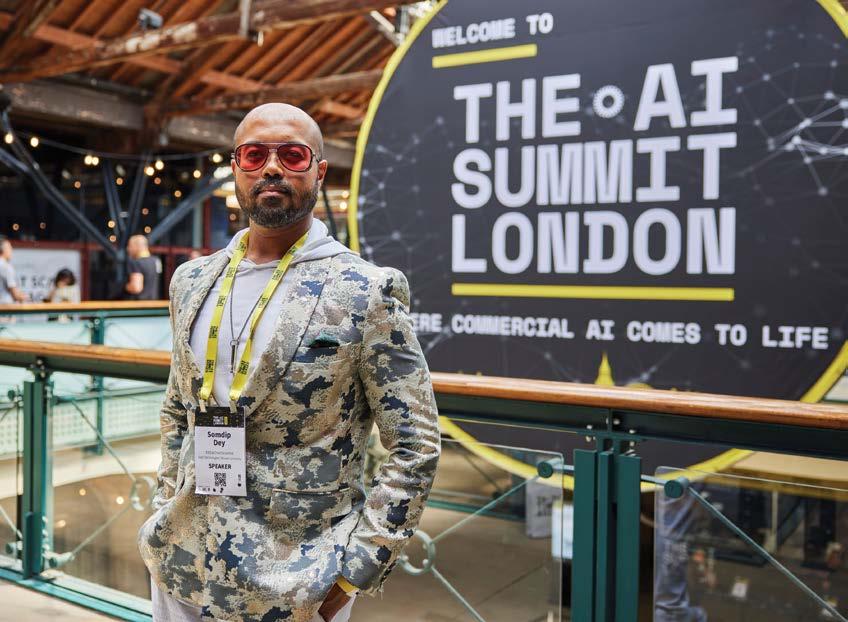
Food waste is often dismissed as an unfortunate by-product of modern life - but for Somdip Dey, it’s a problem demanding urgent attention. Drawing on his academic expertise and personal experience, Dey has developed Nosh Technologies, an AI-driven startup that aims to help households, retailers, and councils reduce waste and rethink how we manage food. It’s an ambitious push to solve one of the UK’s toughest environmental problems - with innovation that actually works.
Why did you choose to build Nosh Technologies from Colchester – not London – and how has that shaped your journey?
While London is often seen as the epicentre for startups, its saturated ecosystem makes it hard for emerging founders to stand out. Colchester, on the other hand, offered us the space, support, and spotlight
to thrive. I was pursuing my PhD in Embedded AI at the University of Essex when the idea for the nosh app was born, so staying local gave us access to academic talent, research infrastructure, and regional funding like the BBSRC Impact Acceleration Account (IAA) award. Building in Colchester not only rooted our innovation in an underrepresented region but also allowed us to represent Essex on global stages like TechCrunch Disrupt, showcasing that deep tech innovation doesn’t have to come from a capital postcode.
What inspired you to tackle food waste with AI?
In 2014, while I was studying at the University of Manchester, a family emergency left me financially drained. I had to survive an entire week on food salvaged from bins—an experience that opened my eyes to the paradox of food waste and hunger. That same year, I co-created the world’s first crowd food-sharing app to help people redistribute leftovers and surplus to others in need. Later, during the COVID-19 lockdowns in 2020, food waste within households spiked again due to irregular shopping patterns and perishables going bad. Combining that experience with my PhD research in Embedded AI, I developed the nosh app with Suman Saha to help households and businesses use AI to manage inven-

AS BOTH AN ACADEMIC AND FOUNDER, I FACE THE TENSION BETWEEN BUILDING OPEN-SOURCE AI FOR FAIRNESS AND KEEPING PARTS OF OUR TECH CLOSED FOR MONETISATION. NAVIGATING THAT DUALITY WHILE STAYING USER-FOCUSED IS AN ONGOING
tory, cut waste, and live more sustainably.
From households to councils and shops, how are you scaling Nosh’s impact across the UK?
We started with households, offering AI-powered inventory tracking, recipe suggestions, and carbon footprint insights. We then expanded to shops with our nosh Shop platform— helping food retailers and producers sell about-toexpire inventory and generate WRAP reports for regulatory compliance. This was supported by the BBSRC IAA fund. More recently, we partnered with local councils to pilot in-app waste collection features that link households directly to council services. Winning the Innovate UK Unlocking Potential Award allowed us to expand further by launching nosh Aura, which brings Generative AI-powered fitness and meal planning to users— all through a single app. Our approach is systemwide, scalable, and
designed to adapt locally.
What’s the biggest challenge in building sustainable tech that people actually use daily? Two key challenges come to mind. First, satisfied users rarely leave feedback, but unhappy ones almost always do—making it hard to measure silent success. Yet we deliberately avoid pestering users for reviews to preserve a frictionless experience. Second, innovating in AI while maintaining a seamless user interface is a constant balancing act. As both an academic and founder, I face the tension between building open-source AI for fairness and keeping parts of our tech closed for monetisation. Navigating that duality while staying user-focused is an ongoing challenge. We use both human and AI-driven feedback loops to continuously refine our product and user experience. Additionally, this year at the 2025 AI Summit London my talk focused on the debate between
open-source and closed AI models such that AI developers and companies could better understand which model to focus on for their needs.
What’s the one lesson every founder should learn early—but usually doesn’t?
It’s managing finances. Too many early-stage founders burn through capital too quickly without sustainable planning. I’ve seen this firsthand through peers in the Forbes 30 Under 30 and MIT Innovators Under 35 networks that I am part of. From my own experience—some hard-earned—I learned the value of lean operations. That inspired me to write “The Frugal Founder: Thriving in Entrepreneurship with Lean Principles”, a practical guide on how to stretch startup capital wisely without sacrificing innovation. Every founder should learn to build with discipline, not just ambition. Financial prudence doesn’t stifle growth—it sustains it.
→ Ayman Al Awadhi, Co-founder and Group Managing Director of The Corporate Group
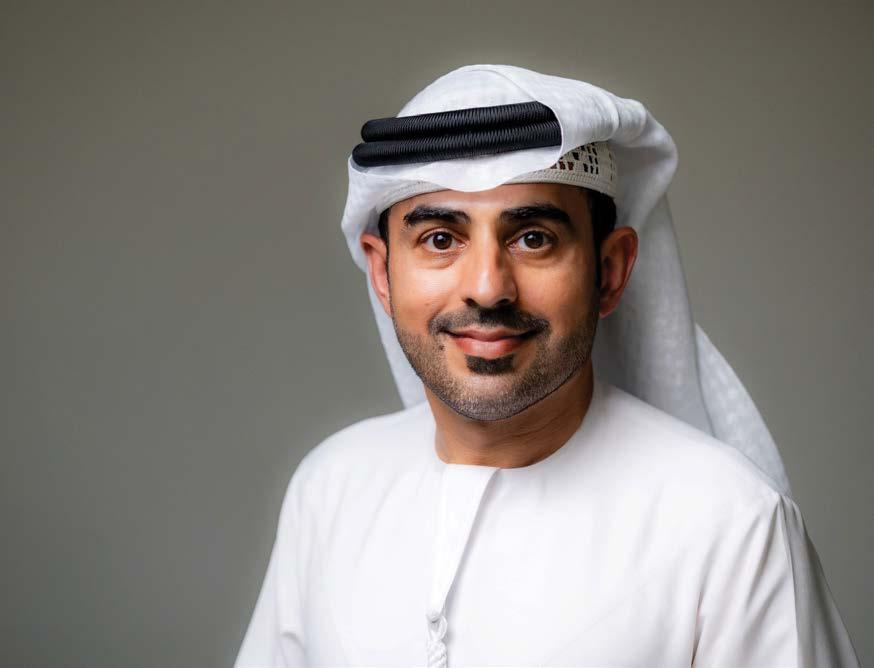
The Emirati executive helping British businesses crack the code.
by PATRICIA CULLEN
When British companies look to the United Arab Emirates (UAE), they often see a mirage — shimmering opportunities, fast growth, tax advantages, a sparkling skyline of possibility. But, as Ayman Al Awadhi, co-founder and Group Managing Director of The Corporate Group knows well, behind the ease of setting up a business in the UAE lies a complex terrain of jurisdictions, legal nuances, and cultural dynamics.
The original vision behind The Corporate Group was that Dubai and the UAE are famous as commercial hubs,” says Al Awadhi. “There are many foreign companies eager to enter this region. We help them not only establish their presence in the UAE and GCC but also guide them through doing business here.”
The Corporate Group holds notable credentials, including registration as an overseas supplier under the UK Department for Business and Trade (UKDBT) program. It also serves as a strategic partner to the Dubai Department of Economy and Tourism (DET) for attracting foreign direct investment (FDI) into Dubai, as well as to the UAE Ministry of Foreign Affairs for FDI promotion across the UAE. What sets The Corporate Group apart, he explains, is authenticity. “We operate as an Emirati entity that understands the culture and local norms. We bridge
DUBAI RANKS AMONG THE TOP 10 GLOBAL DESTINATIONS FOR MICE. EVERY MAJOR GLOBAL EVENT OR TRADE SHOW FORMAT EXISTS HERE. IT’S A HUGE ADVANTAGE FOR BRITISH COMPANIES BECAUSE THEY CAN EXPLORE THE ENTIRE BUSINESS LANDSCAPE IN JUST A FEW DAYS”
the gap so foreign companies can get to market quickly and effectively.” In a region often misunderstood by outsiders, Al Awadhi has become a trusted navigator - a cultural translator and strategic advisor to international firms, particularly British businesses looking for not just a foothold, but staying power.
One of the most common misconceptions UK entrepreneurs

bring, he says, is underestimating the complexity of the local environment.“Many believe it’s simple - that the region is fully regulated and easy to navigate without really understanding the local parameters,” he says. “That’s not the case. You need to understand how the environment actually works.” And that environment is far from uniform.
“There are over 40 free trade zones across the UAE. Each city - and even each mainland jurisdiction - operates differently,” he says. “It’s a strength in terms of choice, but also a challenge. It can be overwhelming if you don’t know which option suits your business.” That’s where The Corporate Group can step in to provide strategic support.
Asked about overlooked opportunities, Al Awadhi doesn’t hesitate: the MICE industrymeetings, incentives, conferences, and exhibitions. “Dubai ranks among the top 10 global destinations for MICE,” he explains. “Every major global event or trade show format exists here. It’s a huge advantage for British companies because they can explore the entire business landscape in just a few days.”
Dubai and Abu Dhabi host more than 300 major events annuallyproviding ideal opportunities for UK firms to meet regulators, partners, and customers in one trip. “These are key moments for market entry,” he adds. “And beyond trade shows, UK entrepreneurs should engage with
“
THE MARKET HERE IS HUNGRY FOR INNOVATIONAND QUICK TO ADOPT NEW TECHNOLOGIES. THINGS EVOLVE FAST HERE. IF YOU’RE PAYING ATTENTION, YOU CAN STAY AHEAD”
business councils like the newly rebranded British Chamber, which has a presence in both Dubai and Abu Dhabi,” he adds.
For those tracking the UAE’s trajectory, Al Awadhi suggests watching trending topics in the ecosystem. “There’s rising interest in family businesses, venture capital, blockchain, and of course, AI,” he says. “The market here is hungry for innovation - and quick to adopt new technologies.” He notes that governmentled initiatives often drive rapid shifts in demand and regulation. “Things evolve fast here. If you’re paying attention, you can stay ahead.”
Al Awadhi emphasises that choosing the right legal structure can make
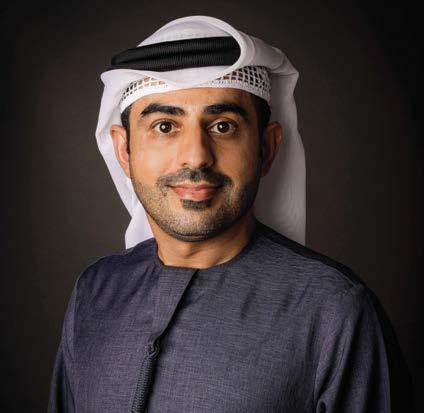
or break a company’s success in the UAE. “You must be clear on your business purpose.
Whether it’s a holding company, an import/ export operation, or a local retail presence - the setup will differ.” Options range from free zone companies and mainland branches to fully owned subsidiaries, joint ventures, and single-owner LLCs. A newer option, the family foundation, offers succession planning and legacy protection.
“You can even separate assets and IP into isolated entities,” he notes. “The UAE’s legal framework is designed to enable flexibility - if you know how to navigate it.”
Al Awadhi has helped a range of British firms expand into the Gulf -
from small family businesses to FTSE 100 giants. One standout: Rentokil Initial, the pest control leader. “They came for market exploration. Within a year, they were acquiring companies and growing fast. Now they have 150+ employees in the region.” He’s just as proud of smaller clients like MCFT, a UK-based family business. “I met them about 10 years ago. We helped set up in Dubai, then expanded to Saudi Arabia. Today, their Gulf operations outperform their UK business.”
Looking ahead, Al Awadhi is optimistic about the UK–UAE relationship. “It’s always been strong. But we’re now pushing for a free trade agreement to reduce costs, tariffs, and barriers for UK companies
operating in the region.” While the final agreement is still in progress, he’s hopeful it will soon apply to the broader GCC. “The UAE is open - but not for the unprepared,” he says.
That’s where The Corporate Group comes in, helping businesses navigate the region’s unique dynamics with clarity and confidence. “To succeed here, you must understand the rhythm, the structure, and the strategy.
}ATTEND A TRADE SHOW Visit Dubai during a key industry conference. It’s the fastest way to meet customers, partners, and regulators in one trip.
}CHOOSE YOUR JURISDICTION WISELY Free zones, mainland entities, and offshore options all serve different purposes. Match your structure to your market strategy.
}TAP INTO LOCAL NETWORKS Engage with the British Chamber and regional business groups to stay informed and build meaningful relationships.
}WATCH THE TRENDS AI, family business succession, blockchain, and green energy are among the fastest-moving sectors.
}GET EXPERT SUPPORT Work with advisors who understand local laws, market dynamics, and cultural nuances — especially those with UK market experience.
The prime minister has announced a £187m investment in a new TechFirst programme to help address the UK digital skills gap. It promises that ‘pupils across the country will be given the skills and tools needed to get the AI-powered jobs of the future’. by
CHRISTINA LOVELOCK

DIGITAL SKILLS GAP
The ‘digital skills gap’ is costing the UK around £63bn annually and 75% of tech firms are struggling to recruit. The digital skills gap isn’t just a recruitment issue - it’s a growth inhibitor. When one in three UK tech founders cite talent shortages as their biggest challenge, it reveals a systemic drag on innovation, product development, and market expansion. Closing the skills gap means more than filling vacancies; it’s about unlocking capacity, speeding up time to market, and enabling the next wave of high growth-potential companies to scale with confidence. The TechFirst programme should be of
particular interest to start-ups. Start-ups often can’t compete with big tech salaries. So, a steady stream of skilled young talent will reduce recruitment and training costs and will help start-ups grow sustainably.
Most people who work in tech do not write code. Initiatives aimed at getting more people to consider a career in tech are often focused on coding – such as coding clubs and boot camps. There is very little emphasis on the wide range of roles that require curiosity, collaboration and creativity, and absolutely zero coding ability. Hopefully the
TechFirst programme will consider the full range of tech roles, and the skills needed to be successful in them.
Only about 10% of the UK workforce has a computer science or IT related degree, according to BCS and Coding Black Females. Tech professionals have a variety of educational backgrounds, including STEM, humanities and arts degrees, and many have followed nonuniversity paths into tech, including apprenticeships and entry level roles.
Start-ups often struggle to make the 12- or 18-month commitment required to take on a digital apprentice. This is a missed opportunity.
Apprenticeships are a budget-friendly way to scale. By creating opportunities for early-career professionals, such as apprenticeships and other types of entry roles, it is much easier to start to turn the dial on diversity. Diverse teams are far more likely to make better decisions, and Innovate UK found that 73% of start-ups believe
that diversity improves innovation. According to Shaw Trust, companies with above-average diversity generate 45% of their revenue from innovation, compared to just 26% for those with below-average diversity.
Given the rapid evolution and advancement of generative and agentic AI, it is difficult to predict exactly what skills humans will need to work with and develop AI tools. One thing is clear: a growth mindset and a commitment to life-long learning is what keeps tech professionals in jobs. Fostering this approach in the next generation is vital, because while tools and ‘tech skills’ may change, the ability to learn, adapt and grow will always be the most future-proofed skill we can pass on.

Christina Lovelock is a digital leader, coach and author of Careers in Tech, Data and Digital. She is the Director of Community at the techconsultancy Herd Consulting.

In a start-up culture often defined by speed, scale, and spectacle, building something quietly effective can feel radical. But for founders working in complex, often overlooked industries, the path to real impact starts not with disruption - but with discipline.
“I’m a non-technical founder,” says Kate Hofman, CEO and co-founder of Pesto AI, an AI-powered platform designed to help food and drink businesses streamline operations, “and no-code tools like Lovable and Manus have blown me away. Not only has my productivity shot up, but my technical understanding has skyrocketed, because I’ve got a new way of interacting with code and tech tools.”
Her start- up, Pesto AI, works with food and drink brands - sectors often overshadowed in venture capital circles by shinier, software-native
domains. But it is here, in the complexity of physical goods and perishable logistics, that Hofman sees the deepest need for real innovation. “Ultimately it means we’ll be able to solve more problems for our customers by bringing the right tech into the food and drink industry.”
This year, that quiet clarity is paying off. Pesto AI is expanding, its platform increasingly recognised for practical AI integrations in an industry where margins are tight and tech fatigue is real. But the journey has required some hard rewiring - of product thinking, of leadership habits, and of personal belief. “I thought building a great product would speak for itself. But with the pace of AI and its impact on the software industry, I’ve totally reversed my belief,” Hofman reflects. “Tech isn’t a moat anymore. In reality, if you don’t tell the story clearly, and explain why your product matters and the difference it will make for your customers, it won’t cut through, no matter how good it is.”
It’s a refreshingly candid admission, and one that few early-stage founders would volunteer so freely. But Hofman’s approach is rooted in deliberate openness - especially with her team. She holds monthly one-to-one feedback sessions with each of her co-founders.
It’s a ritual that has sharpened the company’s internal culture and exposed some of her own
blind spots. “One thing I’ve been working on that’s come out of those sessions is to stop my self-doubt,” she says. “There are so many challenges you face as an early stage start-up, never mind as a female founder - the last thing I or my company needs is for my self-doubt to sabotage something!”
Many founders balance self-awareness with self-doubt, shaped by a culture that often equates confidence with competence - a dynamic that can be especially challenging for women in male-dominated fields. Hofman chooses steadiness over certainty, focusing instead on continual learning.
underrated edge UK founders have right now is constraint,” she says. “The economic climate can feel brutal, and especially for the food and drink brands we work with at Pesto AI. But that pressure forces us to stay laser-focused on solving real problems. We can’t afford fluff! Every feature we build has to deliver tangible value. It’s challenging, but it sharpens your instincts and your product.”
This, then, is Hofman’s
I’m excited for the next decade of the UK start-up ecosystem. I see the UK becoming a powerhouse for purpose-driven highgrowth start-ups, driving sustainable economic growth through products and services that have a meaningful impact on businesses, people and planet” “
a founder, but as someone invested in reshaping the start-up ecosystem itself - particularly in the UK.
“I’m excited for the next decade of the UK start-up ecosystem,” she says. “I see the UK becoming a powerhouse for purposedriven high-growth start-ups, driving sustainable economic growth through products and services that have a meaningful impact on businesses, people and planet.” It’s an aspirational vision, but not a naïve one. Hofman is acutely aware of what’s still missing. “We’ve got a long way to go to bring the kind of diversity of leadership into the ecosystem that will ultimately deliver stronger results and better returns,” she says. “But I can see the first shoots of that already happening.”
In many ways, she is part of those first shoots: a female, non-technical founder building AI infrastructure for one of the most legacy-bound sectors in the economyand doing so without the typical playbook. The fact that she’s succeeding, on her own terms, suggests the ecosystem is beginning to change.
“For me, the most
vision of a start-up: not a sugar-rush of launches and pivots, but a slow-burn exercise in focus - driven less by market hype and more by product-market empathy. Her lens is broader than Pesto AI. Hofman speaks not just as
Hofman’s voice cuts through the noise. She isn’t chasing quick wins or fleeting fame - her focus is on building something that lasts. In a start-up world often obsessed with haste and hype, her steady, deliberate approach is a reminder that real change often takes time. And it’s almost always worth the wait.
Lessons from a leader by ENTREPRENEUR UK STAFF

→ James Rowell, founder of Capture Expense
Starting a business was just me, building a platform strong enough to compete in the market without a brand, revenue, or team,” says James Rowell, founder of Capture Expense, a London-based expense management platform. The biggest hurdle, he recalls, was “establishing credibility.” To bridge the trust gap, Rowell “self-certified under Cyber Essentials and achieved ISO standards aimed at SMEs,” a move that helped win over early customers, who
became vital references. Despite securing interest from large clients who “loved the solution,” financial backing remained elusive. “We simply didn’t look like a ‘safe bet’ as a small company,” he explains. “Investing heavily in marketing would be wasted without first closing that credibility gap.” This realisation prompted a pivot towards seeking investment to “accelerate growth to match the opportunity.”
Cash flow proved a further challenge. Softwareas-a-service (SaaS) ventures “take time to build momentum,” and although
YOU’LL BOOTSTRAP FOR MUCH LONGER THAN YOU EXPECT. INVESTORS TYPICALLY WANT TO SEE REAL TRACTION BEFORE THEY’RE WILLING TO TAKE A RISK” “
customers were won, growth wasn’t fast enough to fund expansion. “I stayed extremely lean, reinvesting everything into development and marketing, but serious scale required serious cash. Next time, I would plan for that much earlier.”
Opportunity came from early conversations. “I started advertising very early, even before the product was fully built, just to open conversations with potential customers.” These exchanges revealed “what customers cared about most, what was missing from competitors, and how to shape our sales approach.” Instead of chasing every feature, the focus became “solving the biggest gaps first” with a product that was “better, faster, and easier to use.”
Looking back, Rowell offers a candid appraisal of the UK start-up landscape. “You’ll bootstrap for much longer than you expect. Investors typically want to see real traction before they’re willing to take a risk.” For those without an existing network, joining an incubator “is worth considering, but be careful not to give away too much equity too early.”
And the essential advice for new founders? “Pick a real, painful problem and solve it properly. Start by aiming at a small or specialised market, listen closely to your customers, iterate quickly, and only then think about expanding.” Hindsight, he admits, shows he “tried to go too wide too early and spent far too long without making meaningful progress.”
